#new palace livadia
Text
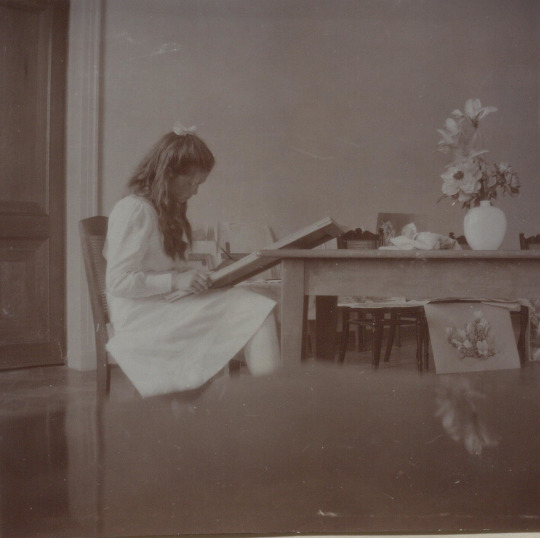

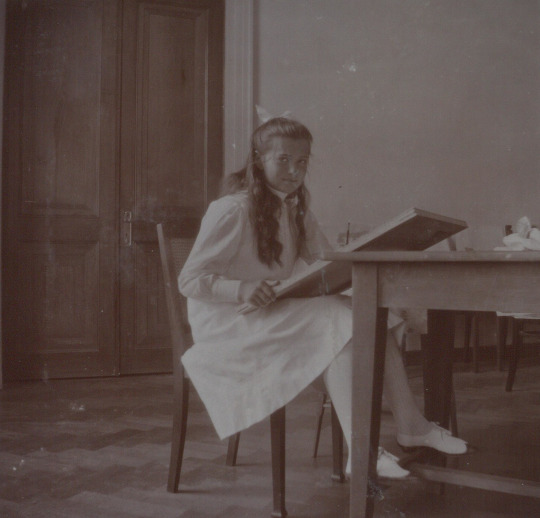

Grand Duchess Maria Nikolaevna of Russia working on an art piece, Livadia 1912
#maria nikolaevna#livadia#1912#romanov#grand duchess maria#grand duchess maria nikolaevna#new palace livadia#art#m#romanovs#crimea#early 1900s#maria nikolaevna of Russia#maria romanov
78 notes
·
View notes
Text
"In St. Petersburg we work, but at Livadia, we live."
Grand Duchess Olga Alexandrovna
In 1909, Nikolay Krasnov, who was responsible for the Yousupoff Palace in Koreiz, was engaged to design a new imperial palace in Livadia (before that, there had been an imperial residence in Livadia consisting of a large and a small palace used by Alexander II and later by Alexander III, who died at the smaller residence.) When Nicholas II decided to build the new palace, he also demolished the older residence but left the small palace where his father died.
The Tsar's diary indicates that the Imperial Family discussed the design; it was decided that all four façades of the palace should look different. After 17 months of construction, the new palace was inaugurated on 11 September 1911. In November, Grand Duchess Olga Nikolaevna celebrated her 16th birthday at Livadia.
The family was always the happiest at Livadia.
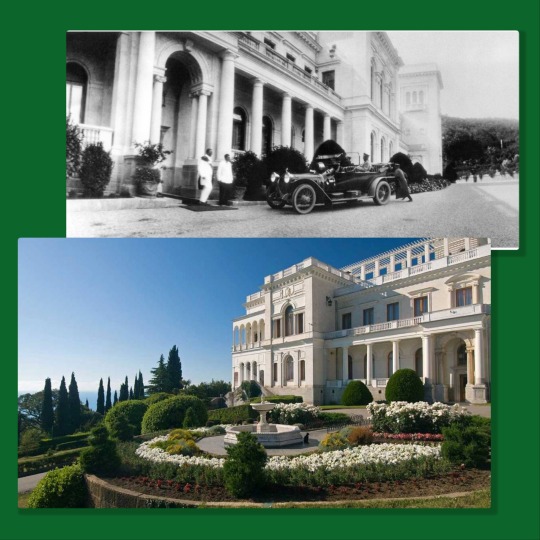
One of the Tsar's "motors" at Livadia. If you look carefully, you can see the "side of the palace" where the car is parked and the main entrance in both the contemporary colored and black and white photos.
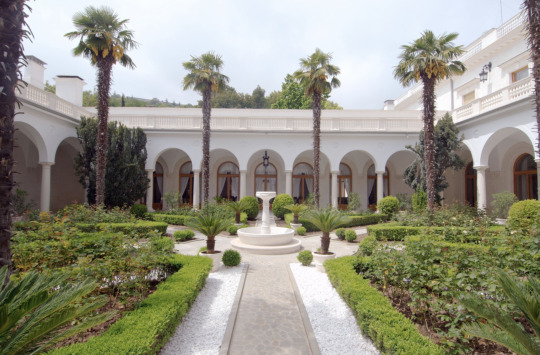
Above is the beautiful Italian Courtyard of the palace as it stands today. If you look at pictures taken when the Romanovs used the palace, the centerpiece of the courtyard was different. Today, there is a fountain at the center. Examining the older pictures (below), you can see that there seemed to be what I can only describe as a "well" at the center of the courtyard. There was a column on each side of the well. In one of the photos below, you can see Grand Duke Dmitry Pavlovich; he had his own rooms at the Livadia Palace.
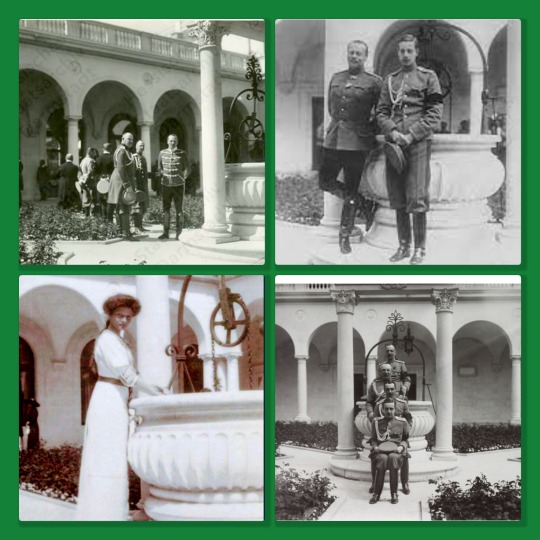
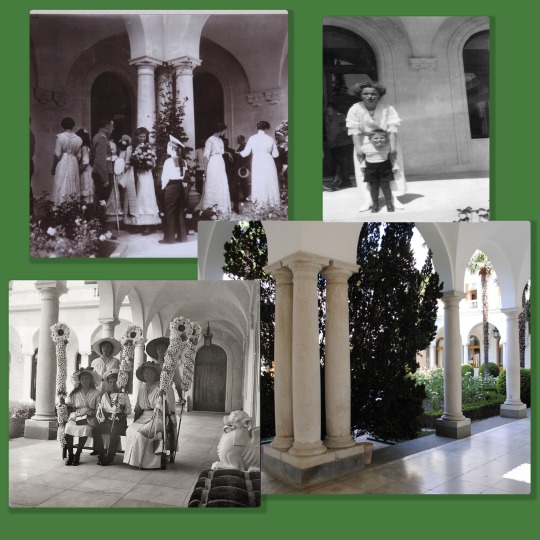
Nicholas II and his family were so at ease at Livadia that they also conducted some minor official functions in addition to family activities. When the family went to Livadia, they usually went as far as Yalta by sea; it is easy to infer that the official activities they conducted were related to the crew of the Standart. In addition, at the time, it was believed that mountain air and rest could cure tuberculosis, and there were several spas and sanatoria in the mountains in the area. The Empress and the girls visited the sick there (they also participated in other charitable activities.)
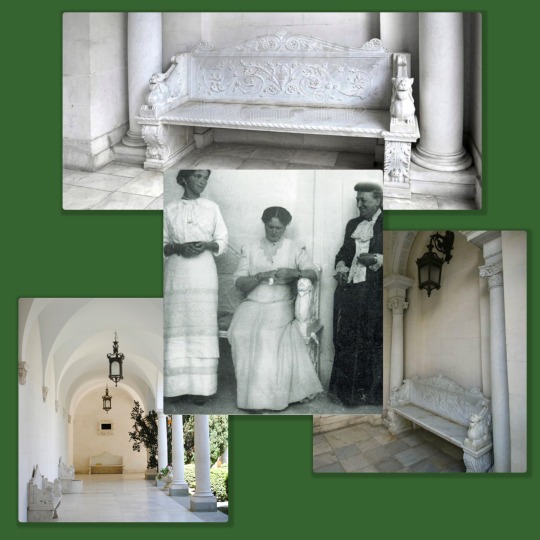


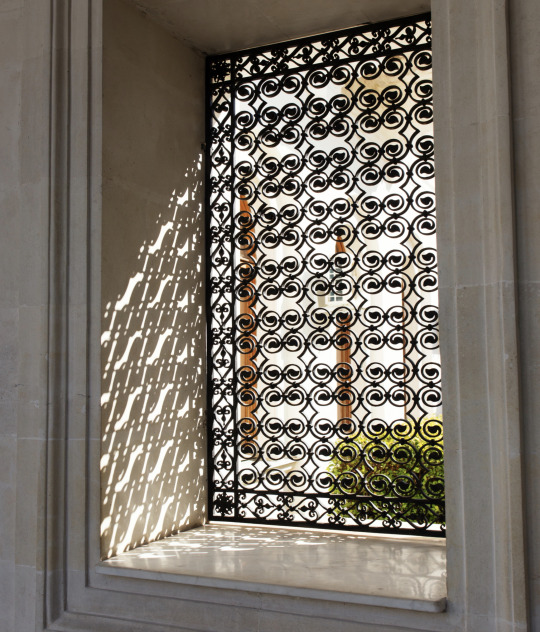
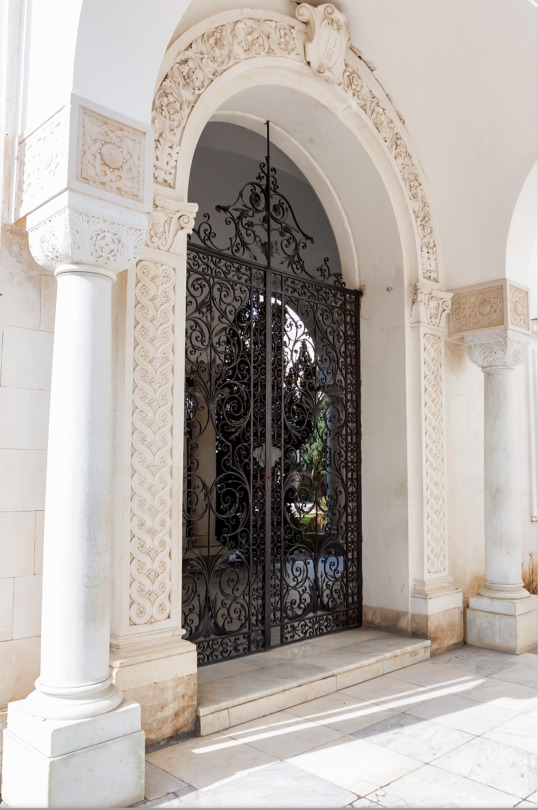
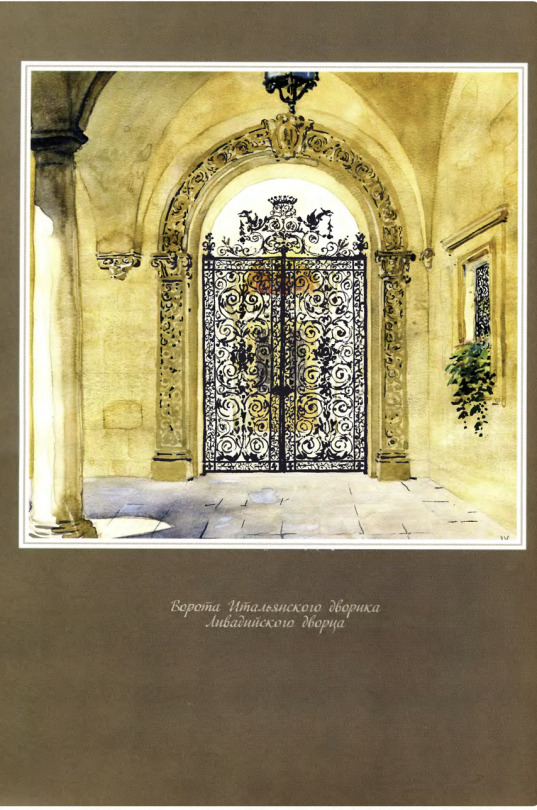
The Yousupov family gifted the beautiful door above to Nicholas and Alexandra. The painting next to it is from a beautiful book by Kravnov ("Fiftieth Anniversary of Yalta"), who worked on the palace's design (and on that of the Crimean summer residences of several Grand Dukes.) The window is also featured in the painting.
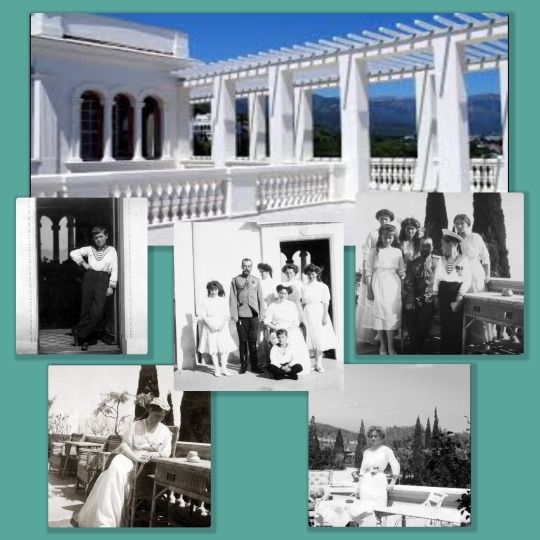
The "solarium" seems to have been a very popular area. Nicholas and his children preferred the outdoors, and Livadia seemed to provide the Empress with the perfect environment to get sun and fresh air in comfort regardless of her many ailments.
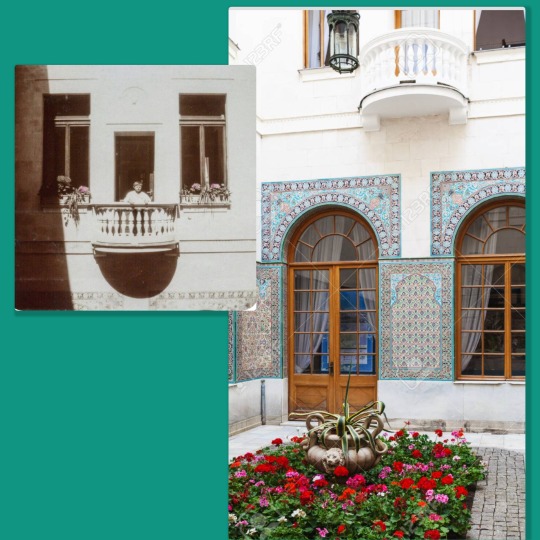
This is the "Moorish" courtyard of the palace. It is small, but notice the exquisite tilework on the walls. And, of course, the little balcony between the windows seemed perfect to Alexis for him to "address" his family.
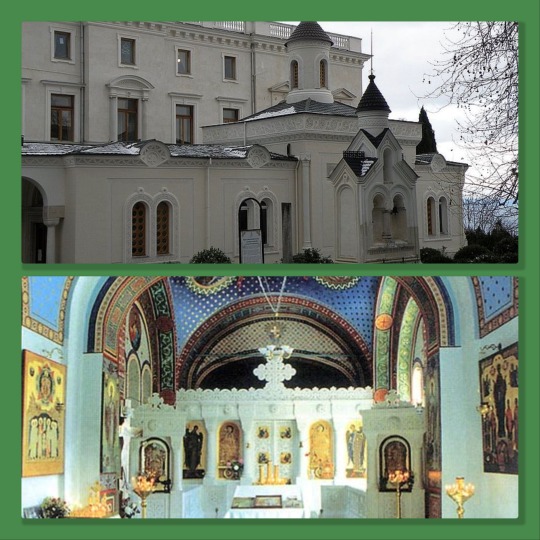
The palace had a chapel so that the Romanov family could worship in privacy.
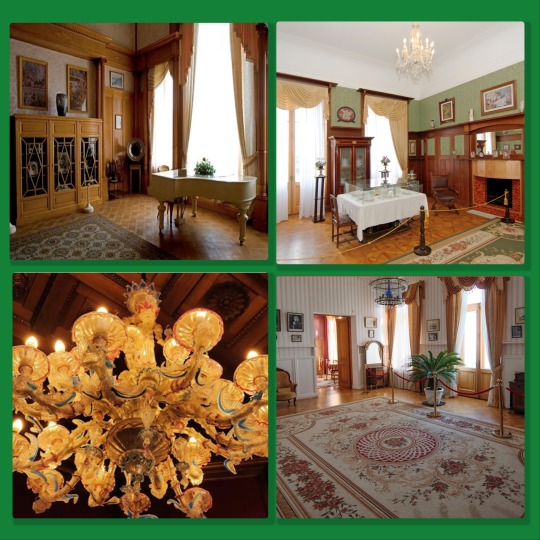
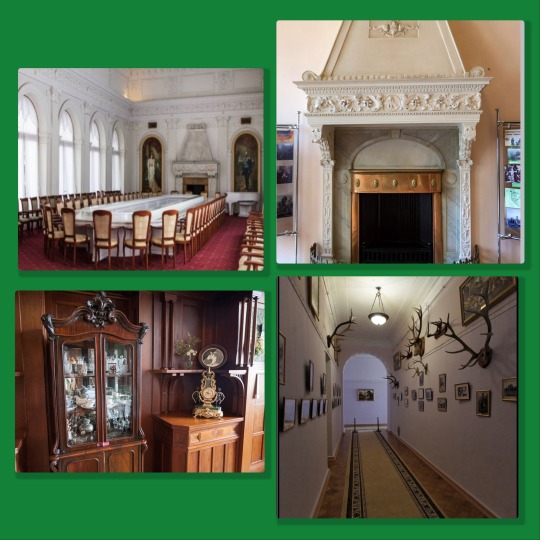
A few of the interiors of the palace. The chandelier is Murano Glass (amazing that it survived all these years.) Olga's coming-of-age celebration took place in Livadia in the formal dining room in the photograph above, dancing spilling into the flower-perfumed courtyard. That is a luxury of the type you cannot buy! The girls' rooms are currently being restored. There are pictures of the rooms as they were, but I was not sure they were from Livadia, so I did not include them.
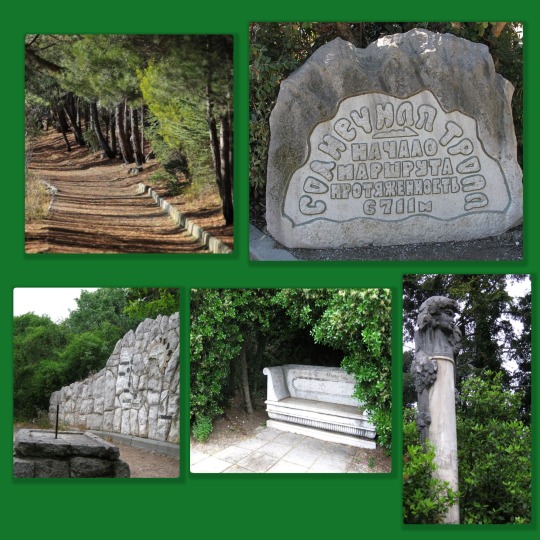
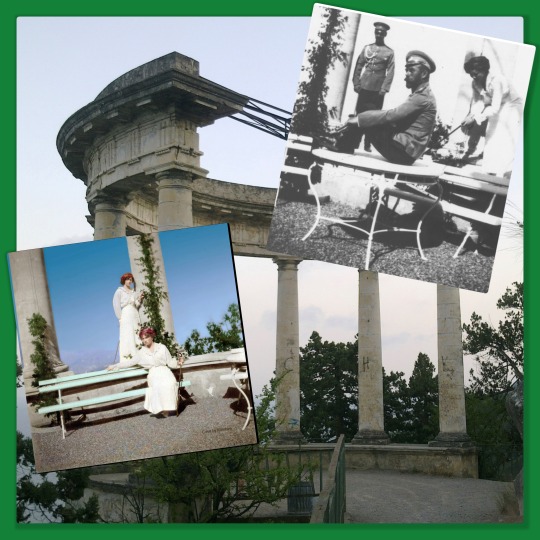
Finally, some photos of the "Tsar's Path" (or Sunny Path), which exists to this day (it goes from Livadia Park to the city of Gaspra.) The family loved to walk this path (regardless of its name, it is not sunny but pleasantly breezy). This path is on one level so that anybody can walk it, regardless of their cardiovascular status. I have read two stories about how it "emerged," and as usual, the truth is probably in the middle. First story: The new Livadia Palace did not exist yet, but the Romanovs used the old palace and always loved coming to Livadia. Alexander III kept gaining weight, and his doctor recommended that he walk but not overdo it...so Alexander had the path leveled. The path's beginning and end differed from what they would be later. Second Story: Sandro had the path from Ay Todor toward Livadia built because Nicholas and Sandro's families always visited each other (they started calling it the Prince's Path.) Nicholas loved the idea and extended the path.
Today, the main path remains, and other routes to other small towns can be hiked from it. Many of the same benches and sculptures are where they were at the time of the Romanovs.
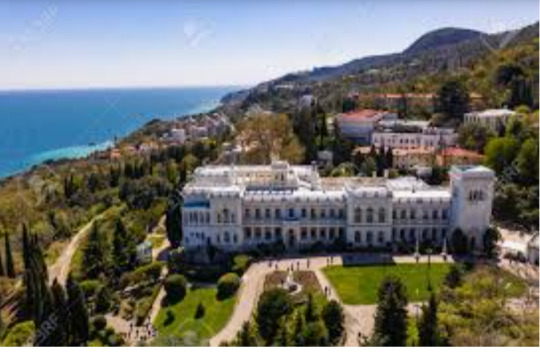
Just one last photo. Here, you can see how close the palace is to the mountains and the sea. A beautiful big house full of fresh air and light with flowers perfuming the air. No wonder Olga liked it so much! (gcl)
#russian history#romanov dynasty#nicholas ii#otma#Empress Alexandra Feodorovna#Emperor Alexander III#Grand Duke Alexander Mikhailovich#Ay Todor#Nikolay Krasnov#grand duchess olga nicholayevna#Grand Duchess Tatiana Nicholayevna#Grand Duchess Maria Nicholayevna#Grand Duchess Anastasia Nicholayevna#Tsarevich Alexei
57 notes
·
View notes
Text

On the photograph from the left to right: the Grand Duchesses Olga Nikolaevna, Tatyana Nikolaevna, Maria Nikolaevna, and Anastasia Nikolaevna. On their right wrists the gold non-removable bracelets are visible. Livadia Palace, 1916
[...] 'However, even though the amount of jewellery on the four daughters was minimal there were some pieces present and are quite visible on each photograph. These pieces are: the gold non-removable bracelets, and three watches – worn by Olga Nikolaevna, Tatyana Nikolaevna, and Anastasia Nikolaevna. The gold non-removable bracelets were worn by the daughters on their right wrists. They are not only visible on the photographs of the Tsarskoe Selo period but also on earlier ones.
The information about the gold bracelets can be found in the diary of Alexandra Feodorovna dated 4 July 1918 (new style date): ‘and a bracelet per child which we had given them as presents.’ As per the same dairy entry, Alexandra Feodorovna herself had two similar bracelets: ‘they only left me the two bracelets from uncle Leo, which are non-removable’. ‘They’ in the last quote refers to the commandant of the Ipatievsky house, Yakov Mikhailovich Yurovsky (7 June 1878 - 2 August 1938), and his assistant Georgi Petrovich Nikulin (27 December 1894 – 22 September 1965).
In his notes, Yurovsky gives more details about the bracelets in question: ‘Alexandra Feodorovna, however, expressed her displeasure when I was going to remove a gold bracelet from her hand; it was locked and it was not possible to remove it without a special tool. She proclaimed that she had been wearing the bracelet for 20 years and now it was being attempted to be removed. Taking into consideration that similar bracelets were worn by her daughters and that they were not of particular value, I decided to leave them.’ (Notes by Yurovsky Y.M. P.109, 1934)' - Seraphima Bogomolova
Read more in Part One: 'Like Kings and Queens, Like Princes and Princesses'

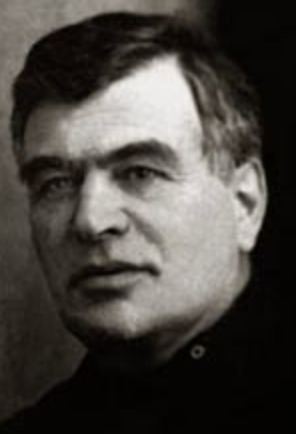
On the photographs: on the left - Georgi Petrovich Nikulin (27 December 1894 – 22 September 1965), the assistant to commandant of the Ipatievsky house; on the right - Yakov Mikhailovich Yurovsky (7 June 1878 - 2 August 1938), the commandant of the Ipatievsky house.
#Romanovs#Nicolas II#investigation#research#jewellery#Romanovs jewellery#Anastasia Nikolaevna#Maria Nikolaevna#Tatyana Nikolaevna#Olga Nikolaevna#gold bracelets#Yakov Mikhailovich Yurovsky#Georgi Petrovich Nikulin#watches#July 1918#summer 1917#seraphima bogomolova#murder mystery
4 notes
·
View notes
Text
Zelensky, 2022, Stalin 1942: The US ‘Propaganda Machine’ Can Easily Make Heroes, But It Can Quickly Change The Script
The US campaign to build public support for Ukraine harks back to a propaganda push lionizing Stalin’s Soviet regime during WWII

— By Tony Cox! Tony Cox, a US journalist who has written or edited for Bloomberg and several major daily newspapers.
America’s sudden love affair with Ukrainian President Vladimir Zelensky and Kiev’s military forces is reminiscent of an old campaign to exalt a previous ally of geopolitical circumstance: Soviet dictator Joseph Stalin.
Just as in the Georgian strongman's heyday, the US political establishment and media-entertainment complex have responded to a crisis in Eastern Europe by portraying their preferred combatants as heroic friends who must be supported. In fact, Zelensky and his country’s defenders have been painted as freedom fighters battling to save democracy from evil aggressors – even as Kiev bans opposition parties, shuts down media outlets, and otherwise silences critics of the regime.
For instance, outlets such as Newsweek and the Associated Press have touted Zelensky as a “defiant hero” and a “modern Churchill.” The comparison to former UK Prime Minister Winston Churchill wasn’t sufficiently glowing for CNN, which said Zelensky is a “more unlikely hero.”
After all, the liberal network argued, Churchill was “an imperialist rather than a pure believer in democracy.” Zelensky, despite taking such actions as arresting the main opposition party's leader and banning critical TV and online outlets, apparently qualifies as a greater democrat than a man who lost office, by the ballot box, shortly after his greatest victory.
Eight decades ago, Churchill and US President Franklin Roosevelt faced a similar challenge in trying to beautify the Western public image of Stalin, a hated enemy before Nazi leader Adolf Hitler broke a non-aggression pact by attacking the Soviet Union. As American historian Albert Marrin wrote in ‘A Time of Fear’, his 2021 book on the red scares before and after World War II, there was considerable public concern “over fighting one mass murderer with the help of another.” The joke back then was that the main difference between Stalin and Hitler was the size of their mustaches. “Otherwise, they were the same cold-blooded monsters,” Marrin said.
But the Allied powers deemed support for the Soviets advantageous to keep Axis forces deployed on the Eastern Front, where 90% of German casualties would be suffered, taking much of the heat off their own armies. The White House used its new Office of War Information (OWI) propaganda unit to burnish the Soviet regime’s image while providing $11.3 billion in wartime aid to the USSR, equivalent to nearly $190 billion in today’s dollars.
As in the current conflict, media outlets did much of the heavy lifting. Stalin was depicted as “Uncle Joe,” a trusted ally and brave leader. He appeared on the covers of major magazines, including three times on Time, which named the Georgian generalissimo its “Man of the Year” in January 1943.

Joseph Stalin and Winston Churchill at the Yalta Conference held at the Livadia Palace, Livadiya, Soviet Union, February 1945. © PhotoQuest/Getty Images
Later that same year, Collier’s magazine did a cover story making the dubious claim that the USSR was evolving “toward something resembling our own and Great Britain’s democracy.” This was a half decade after the Great Purge, when Stalin wiped out somewhere in the region of a million people during an attempt to eliminate perceived political threats.
The New York Times agreed, asserting in 1944 that “Marxian thinking in Soviet Russia is out. The capitalist system, better described as the competitive system, is back.”
Life magazine promoted the Soviet leadership present and past, including calling Vladimir Lenin “a normal, well-balanced man who was dedicated to rescuing 140 million people from a brutal and incompetent tyranny.” That was strangely high praise, given that the US government didn’t recognize the USSR until nearly a decade after Lenin’s death. Life also praised Soviet citizens, calling them “one hell of a people” who “look like Americans, dress like Americans and think like Americans.”
Stalin’s brutal secret police, the NKVD, were described as “national police similar to the FBI,” whose job was “tracking traitors.” Life added, “If Soviet leaders tell us anything, we can afford to take their word for it.”
The OWI also made efforts to promote the Soviet Red Army. A 1942 propaganda poster showing a smiling, apparently Russian, soldier was captioned, “This man is your friend. He fights for freedom.”

Photo of smiling Russian soldier wearing helmet, with rifle. © Wikipedia
Fast-forward to today, and praise for Ukraine’s military is similarly effusive. The Pentagon, for example, has been so impressed by Kiev’s forces that its leaders have suggested their exploits will be studied by future generations of soldiers. Ukraine’s fighters “will go down in military history” for their resilience in battling the Russian military, US Secretary of Defense Lloyd Austin said in April.
Even in defeat, such as Russia’s capture of Severodonetsk last month, the Pentagon has hailed the fighting prowess of Ukraine’s personnel. An unidentified US official has been quoted as saying that when Ukrainian forces retreated, “they chose to do [it] of their own accord.”
However, the current portrait of Ukrainian forces has required major airbrushing of neo-Nazi elements, which establishment media outlets covered more openly before Russia launched its military offensive in February. As Reuters pointed out in 2018, dozens of volunteer militias in Ukraine use Nazi symbolism and recruit Hitler acolytes into their ranks.
Those groups have attacked anti-fascist demonstrations, government meetings, media outlets, foreign students and minorities, among other targets, Reuters noted. Some 40 US senators signed a letter in 2019 demanding that some of those militias, including the Azov Battalion, be designated as terrorist organizations.
But with Ukraine now a media darling, to the extent that major outlets acknowledge the country’s fascist elements, it’s typically to whitewash them. For instance, NBC News argued in March that because Zelensky has Jewish heritage and there have been no “recent mass killings or ethnic purges” in Kiev, it’s “absurd” for Russian President Vladimir Putin to claim that Moscow’s military offensive is partly designed to “denazify” the former Soviet republic.

A group of protesters demonstrate holding placards against Communist sympathizers outside the Fox Wilshire Theatre, Beverly Hills, Los Angeles, California, US, December 1960. © American Stock Archive / Archive Photos/Getty Images
Likewise, President Joe Biden and other US leaders have mocked the notion that Ukraine has a Nazi problem, typically citing Zelensky’s Jewishness as their proof. “Putin has the gall to say he is denazifying Ukraine,” Biden said in March. “This lie isn’t just cynical, it’s obscene.”
However, the fact is Ukraine incorporated neo-nazi militias, including the Azov Battalion, into its National Guard after the country’s democratically elected leadership was overthrown in a US-backed coup in 2014. Those fighters have been hailed for their alleged heroism in battling Russian forces, and Western outlets have amplified Azov propaganda, such as a falsely claimed chemical weapon attack in Mariupol. In fact, immediately after the Russian offensive began, Facebook altered its rules to allow users to praise the Neo-Nazis.
The new wave of apologism for openly fascist elements – Ukraine has statues, street names and public marches venerating WWII-era Nazi collaborators – follows years of US political rhetoric hyping fears of neo-Nazism. Democrats in Congress, including Representatives James Clyburn (South Carolina) and Jerry Nadler (New York), likened then-President Donald Trump to Hitler.
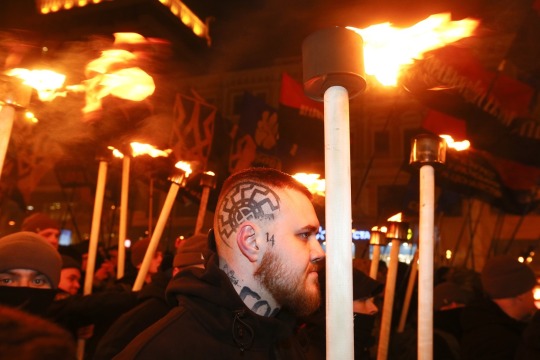
Far-right groups march in Kiev, Ukraine to commemorate Nazi collaborator Stepan Bandera. © Sputnik/Efrem Lukatsky
Prior to the current crisis, Americans knew little about Ukraine, which consistently ranked as one of the poorest and most corrupt nations in Europe. When Ukraine became a big news story during the 2014 coup, the Washington Post found that only one in six Americans were able to find the country on a map. The median guess was 1,800 miles off.
Nevertheless, once Russian tanks rolled across the border, Americans were quick to accept the new narrative about Zelensky and Ukraine. A Pew Research Center poll found that 72% of Americans had confidence in Zelensky to “do the right thing in world affairs.” In fact, the Ukrainian president ranked ahead of all other world leaders in the survey, including Biden at 48%.
Selling the public on Zelensky and Ukraine has been vital, given that the deeply indebted US government is pumping tens of billions of dollars’ worth of aid into Kiev and leading the charge for anti-Russia sanctions, which have contributed to the nation’s highest inflation rates in more than 40 years. And if warnings from Russian leaders are to be believed, the campaign to supply weapons to Ukraine and punish Moscow has put Americans and the rest of humanity at risk of potential nuclear annihilation.
With the stakes so high, critics of Biden’s Ukraine policy have been branded as Russian stooges or traitors. The New York Times and USA Today, among other outlets, have dismissed opposition as “far-right” rhetoric. Such voices have repeated the Kremlin’s “misleading claims” about the war, The Times said, including “unfounded” allegations about US-funded biolabs in Ukraine.
Rolling Stone called Fox News host and Biden critic Tucker Carlson a “Putin sycophant,” while MSNBC suggested that he was echoing Moscow's talking points because he wanted the US to become more like Russia, “with paleoconservative and white nationalist principles.”
Hollywood was quick to jump on the “Stand With Ukraine” bandwagon. Actors Ben Stiller and Sean Penn went so far as to pay visits to Zelensky in Kiev, with the former telling the Ukrainian president, “You’re my hero.” Penn threatened in March to boycott the Academy Awards show and smelt his two Oscars if organizers didn’t invite Zelensky to participate in the event.
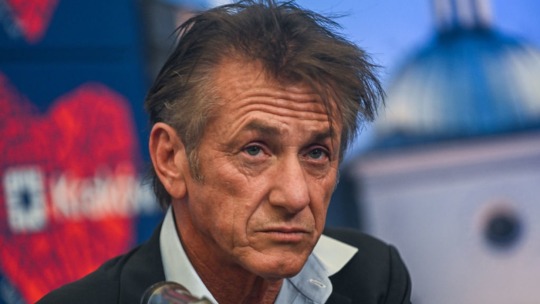
Idiot to his Core, Sean Penn, gives ultimatum on Zelensky speech at Oscars. The actor has threatened to smelt his statuettes if the Ukrainian leader isn’t given a platform at Hollywood’s biggest awards show
As it turned out, Zelensky didn’t get to make a remote appearance, but the Los Angeles awards program featured a moment of silence for Ukraine and an appeal for public donations. The Ukrainian president did give a recorded speech at the Grammy Awards in April.
Zelensky had no reason to doubt the entertainment industry’s support. He told Ukrainians in a March speech, “The whole world admires you, from Hollywood stars to politicians.”
Several major studios announced in March that to show their support for Ukraine, they were halting the release of their films in Russia. In the UK, the opening of a blockbuster Guy Ritchie movie called ‘Operation Fortune’ has reportedly been delayed because it needed to be revised to reflect newfound reverence for Kiev. It turns out that gangsters in the story were identified as Ukrainian, which is no longer acceptable.
Hollywood was also a key pillar in the campaign to sell Americans on Stalin and the Soviets. Studios rushed to produce pro-Soviet films – such as ‘The Boy from Stalingrad’, ‘Song of Russia’, and ‘Moscow Strikes Back’ – in many cases getting OWI approval for their scripts. In ‘Days of Glory’, starring Gregory Peck as “Vladimir,” Soviet guerilla fighters were portrayed as defenders of democracy. ‘The Battle of Russia’ featured ordinary citizens depicted as patriots devoted to their leaders, a theme that was too far-fetched even for Stalin, who once admitted that the Soviet people “fought for their homeland, not for us.”
Roosevelt requested the making of a movie called ‘Mission to Moscow’, which was based on a book by a former US ambassador to the Soviet Union, Joseph Davies. The film portrayed Stalin as a kindly and wise leader with a fondness for children. It sanitized the Moscow show trials of 1936-1938 – which Stalin used to purge his political enemies – depicting them as a necessary step to expose traitors. Speaking to an audience that watched the movie in Chicago, Davies reportedly said, “The word of honor of the Soviet government is as safe as the Bible.”
Ukrainian-born Soviet engineer Victor Kravchenko, who was assigned to Washington under the lend-lease program and later defected, cringed when he heard such gullibility as he traveled around America during the war. In his 1946 book, ‘I Chose Freedom’, Kravchenko recalled: “A thousand times, I had to listen in frustrated silence while the Soviet dictatorship was given full credit for the achievements of the Russian people. Stalin’s grip on the American mind, I realized with a shock, was almost as firm as his grip on the Russian mind.”
Once the war ended, it was no longer necessary to promote Uncle Joe and the Red Army. The temporary allies were quickly estranged once Hitler was vanquished. With a congressional committee hunting down alleged communists as traitors and Hollywood facing pressure to prove its patriotic loyalty, Soviet-related films had a decidedly darker tone, as evidenced by such titles as ‘The Red Menace’ and ‘Behind the Iron Curtain’.
A US poll conducted in March 1946, just 10 months after the war in Europe ended, showed that 60% of Americans believed their government was too soft on policy toward the USSR, while only 3% said it was too tough. By a 65%-25% margin, respondents believed the Soviets would go to war to get what they wanted. Later that same year, a poll showed that 62% of Americans said their feelings had become less friendly toward the Soviet Union, compared with only 2% who said they felt more friendly.
The US-Ukraine relationship remains chummy, though it’s perhaps no longer in a honeymoon phase. Some observers questioned whether the ties were beginning to fray last month, when Biden said Zelensky “didn’t want to hear” Washington’s warnings early this year that the Russians were poised to launch an attack. Ukrainian officials called the claim “absurd.” Biden critics, such as Fox Business host Charles Payne and podcast host Jack Posobiec, said Zelensky was being thrown “under the bus.”
With the economic effects of the conflict multiplying on the home front, US public support for Ukraine aid has begun to wane. Polling by research firm Morning Consult earlier this month showed that 81% of Americans remained at least “somewhat” concerned about the Russian offensive in Ukraine, down from 90% in March. Less than half of respondents (46%) said their government should impose sanctions on Russian oil, even if that causes fuel prices to rise, down from 55% in April. Only 43% of US voters, including 32% of Republicans, see the protection of Ukraine as America’s responsibility, down from 50% in April.
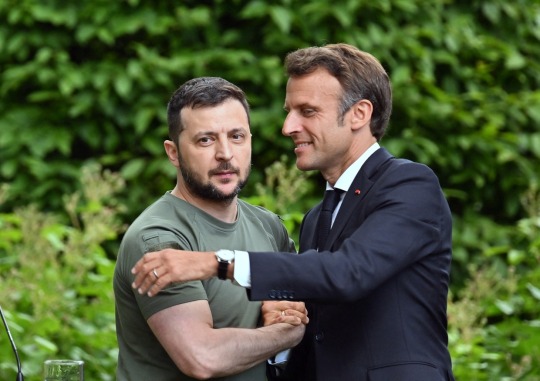
Ukrainian President Volodymyr Zelensky and French President Emmanuel Macron shake hands after giving a press conference in Kyiv, on June 16, 2022. © Sergei Supinsky/AFP
Nevertheless, Biden’s administration is making plans to keep shipping weapons to Ukraine for “months and years,” a Pentagon official told reporters last week. US Secretary of State Antony Blinken reiterated late last month that the administration was committed to backing Kiev for the long haul. “We are giving Ukraine the support it needs to defend itself for as long as it takes, and we will continue to do so,” he said.
Back in May, Blinken linked America’s heroic allies past and present: “Those who study the past know President Zelensky and the brave people of Ukraine embody the spirit of those who prevailed during the second World War.”
— RT | July 16, 2022
0 notes
Photo
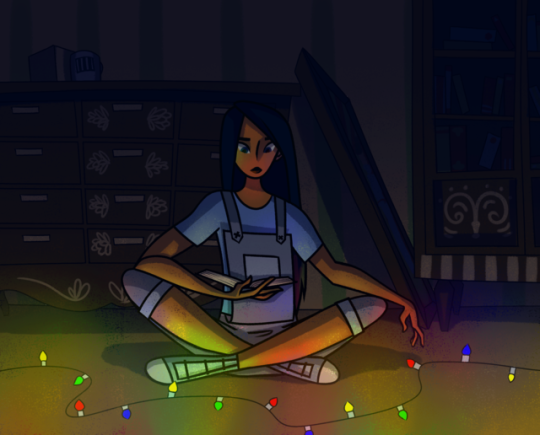
10 notes
·
View notes
Photo
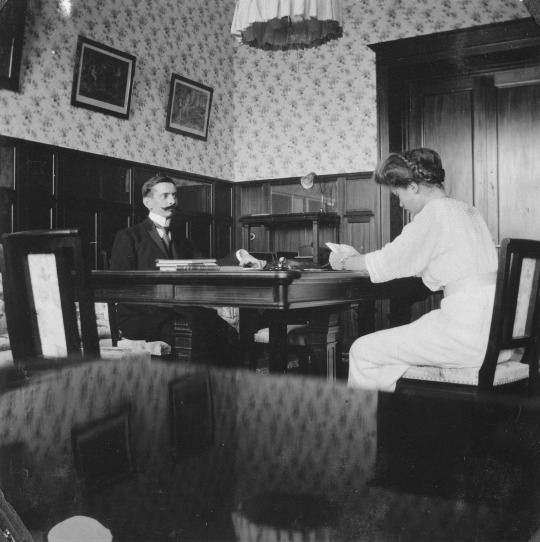
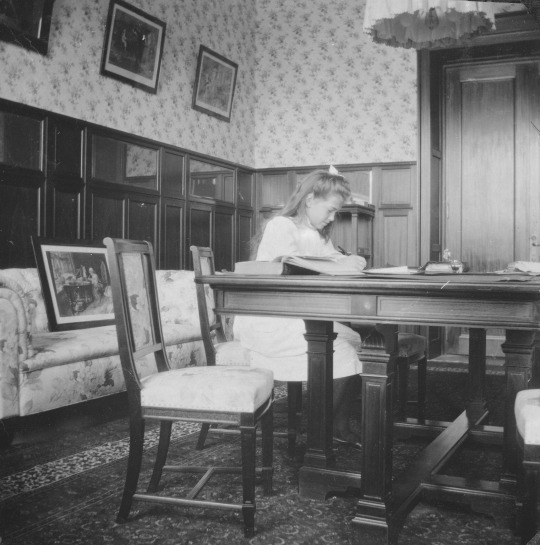
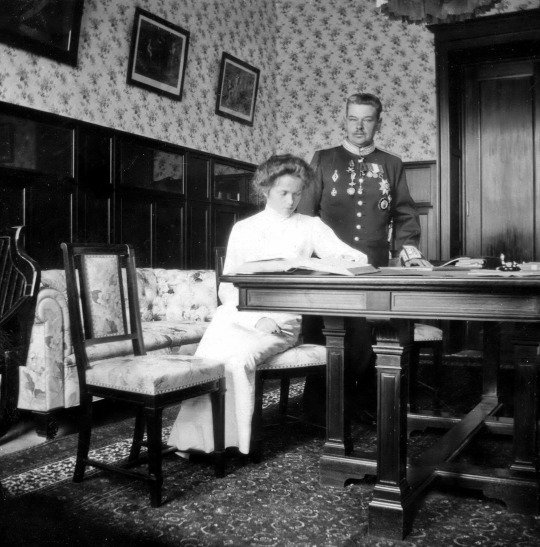
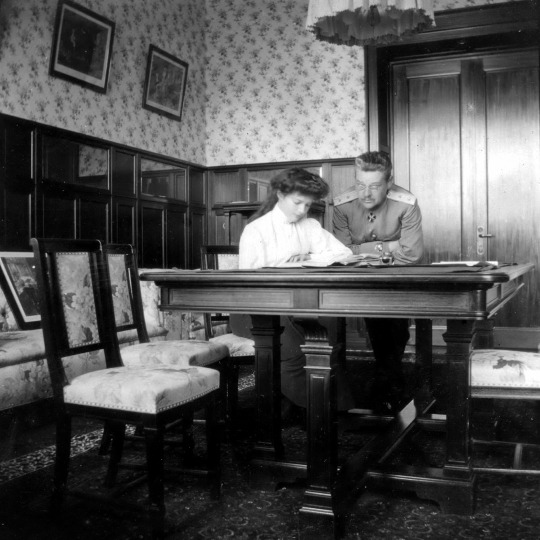

Fall 1911 - Livadia Palace
Photo 1 : Pierre Gilliard and Grand Duchess Olga Nikolaevna in the classroom at the Livadia Palace.
Photo 2 : Grand Duchess Maria Nikolaevna
Photo 3 : Grand Duchess Olga Nikolaevna and Peter Vasilievich Petrov
Photo 4 : Grand Duchess Tatiana Nikolaevna and Peter Vasilievich Petrov
Photo 5 : Grand Duchess Anastasia Nikolaevna
"As I have already said, when I was released from my duties as tutor to Duke Sergei of Leuchtenberg in 1909 I could give more time to the Grand-Duchesses. I lived in St. Petersburg and visited Tsarskoe-Selo five times a week. Although the number of lessons I gave had considerably increased, my pupils made but slow progress, largely because the Imperial family spent months at a time in the Crimea. I regretted more and more that they had not been given a French governess, and each time they returned I always found they had forgotten a good deal. Mademoiselle Tutcheva, their Russian governess, could not do everything, for all her intense devotion and perfect knowledge of languages. It was with a view to overcoming this difficulty that the Tsarina asked me to accompany the family when they left Tsarskoe-Selo for a considerable time.
My first visit under the new dispensation was to the Crimea in the autumn of 1911. I lived in the little town of Yalta, with my colleague, M. Petrov, professor of Russian, who had also been asked to continue his course of teaching. We went to Livadia every day to give our lessons.
The kind of life we led was extremely agreeable, for out of working hours we were absolutely free, and could enjoy the beautiful climate of the 'Russian Riviera' without having to observe the formalities of Court life."
Gilliard, Pierre. (1921) Thirteen years at the Russian court (A personal record of the last years and death of the Czar Nicholas II. and his family). London : Hutchinson & co, pp. 26-27.
Photos from:
Anna Vyrubova's Album N°4
Tatiana Z - Photo n°3 Photo n°4
Romanovs100
#1911#livadia#Olga Nikolaevna Romanova#Tatiana Nikolaevna Romanova#Maria Nikolaevna Romanova#Anastasia Nikolaevna Romanova#pierre gilliard#Peter Vasilievich Petrov
79 notes
·
View notes
Text
National Color Day
Here at the FDR Library we have a collection of color photographs and transparencies in the Archives.

In this image, FDR and Eleanor are seated on the lawn in front of Springwood, August 1932. Photograph by Oscar Jordan.
CT 86-103

The Big Three sit for photographers outside the Livadia Palace during the Yalta Conference, February 9, 1945.
CT 53-70:1A
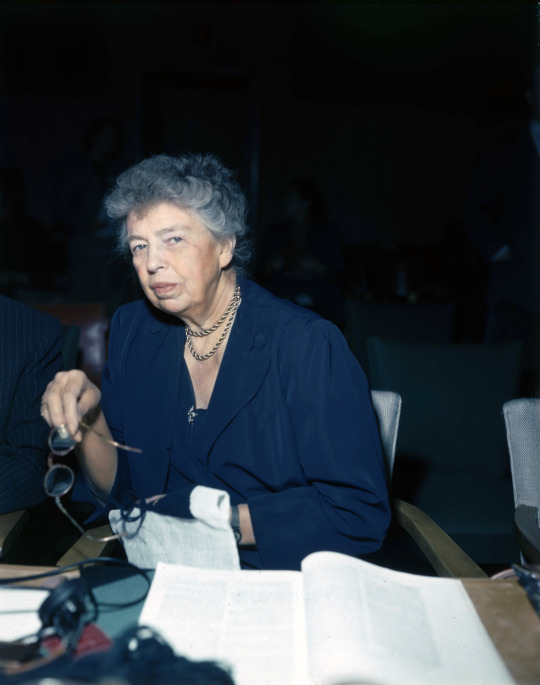
Eleanor at the United Nations, New York, New York, mid-1940s.
CT 74-53
#fdr#franklin d. roosevelt#eleanor roosevelt#springwood#hyde park#new york#yalta#winston churchill#joseph stalin#united nations#1930s#1940s#color photography#national color day
45 notes
·
View notes
Text
Secrecy and Deception Chapter 1
America POV
Event: Yalta Conference
Codename: Argonaut
Location: Livadia, Yusupov, and Vorontsov Palaces; Yalta; Crimean Autonomous Soviet Socialist Republic; Russian Soviet Federative Socialist Republic; Union of Soviet Socialist Republics
Date: February 4-11, 1945
The War in Europe was nearing its end, which meant that conferences discussing what would happen afterwards were happening. I'd rather be fighting on the front lines then attending these conferences though. Everyone was so disagreeable.
The Yalta Conference, the one I was attending now, was the second major conference between myself, Britain, and Soviet. Although Britain did have a complaint about who was attending.
"We really should have invited France to this." Britain said once again as we walked into the Livadia Palace, the place I was standing at, and the place we were holding the meetings. I groaned.
"Please stop bringing that up. I know you wanted her to come, but this is getting annoying." I said.
"She's an important member of the allies!" Britain insisted. I looked at him and raised an eyebrow.
"She got captured in six weeks." I pointed out. While France was an ally, she has spent most of the war under occupation, and therefore wasn't one of the major allies.
"I know she did it's just...I feel bad leaving her out of this." Britain said. I sighed. Britain and France getting along wasn't new, as they had gotten along in the last war, but this was definitely the best I've ever seen them get along, and it was weird.
"I can tell. But stop complaining about it. She's not coming. Let's just get on with this meeting." I said before I walked into the room, seeing Soviet Union already in the room.
"Привет Америка, Британия." The communist nation said as we walked over to him.
"Hello Soviet." I responded.
"Hello Soviet. France asked me to tell you something for her." Britain said. I groaned, knowing where this was going.
"What is the message?" Soviet asked, although the look on his face made it clear that he knew exactly what it would be.
"Va te faire enculer." Britain said, a small smile on his face. Dad enjoyed that more than he should. I paused as I realized what I had just thought. I called Britain dad. Sure, not out loud, but I hadn't thought of him as a parent since 1776.
I pushed the thought aside. I was here for a conference to discuss the postwar reorganization of Germany and Europe. My personal problems would wait.
"She's upset about not being able to come, Да?" Soviet said. Britain nodded.
"She is an ally. She feels jilted." Britain said. I nodded. France was quite upset about that. She had even blamed President Roosevelt's personal antagonism towards her leader as the cause.
"So the great British Empire has been reduced to an errand boy for his former rival." Soviet said. I rolled my eyes.
"If you had let her come, she could speak for herself." Britain responded.
"We aren't here to talk about France. We're here to talk about the postwar reorganization of Germany and Europe." I said, cutting them off before we got wildly off topic.
I was the host of this conference, even though it was taking place in Soviet's land. Which meant it was kind of my job to keep this meeting on track. I'm pretty sure none of us were eager to leave the war for too long. We all had agendas that we wanted to complete. This meeting would hopefully reveal the plans the other two had for after the war. That was kind of the whole point of it.
"Right, sorry. Which issue are we discussing first?" Britain said.
"Poland." Soviet said. I raised my eyebrow at him. Seems like Soviet had some demands he wanted to make, and was eager to make them.
"Germany first. I know you probably have your demands, but the major issue is Germany. Unconditional surrender. We need to get unconditional surrender from Germany." I said.
"Obviously. We can agree on that. So, what happens after we ensure Germany's defeat?" Britain said.
"We should each get a section of Germany to occupy." Soviet said.
"And Berlin." I added. Soviet turned towards me.
"What do you mean by that America?" He asked.
"We each get a piece of Germany to occupy. And we each get a piece of Berlin. It's their capital, and I don't trust one of us to occupy it all on our own and not take advantage of that. We should all get a piece of Berlin." I said.
"I hope you are including France in that." Britain said.
"When we divide up Germany, we can carve out a zone for France." Soviet suggested. Britain shook his head.
"General Charles de Gaulle will not accept a zone for France that was created in his absence." Britain said, "Like I've been saying, France should have come here."
"Well I'm not agreeing to give France a zone if she has to create it herself. She should have stayed in the fight, and not have become Vichy France. She will be left out if she cannot let us create the zone she will occupy. She shouldn't even be a part of the governing body over Germany after this war." Soviet said.
"Well she won't let us make the lines, but we can't leave her out. She may have been occupied, but she's back on the fight now! You can't blame her for being caught off guard by Germany's invasion." Britain argued.
"Oh yes I can and I-" Soviet began before I cut him off.
"What if the zone was created out of mine and Britain's? France needs to be a part of this council. She was a major ally, even if it was only for the beginning and the end." I asked. Soviet paused, and nodded.
"I can agree to that." He said. I nodded, glad I could stop that argument before it got out of hand. We would get nothing out of this if we fought the entire time.
"Well now I'm sure we all want the demilitarization and denazification of Germany. We just need to go about the demilitarization a better way, as we are only in this situation because some countries-" I said shooting a look at Britain "-didn't truly hard enough to ensure Germany followed the Treaty of Versailles and ignored Germany when he killed Weimar, took over and began violating the treaty. We can't let that happen again."
"Very true. We need safeguards against a possible military revival of Germany." Soviet said.
"Their leaders are who we need to target for that first. They are war criminals. We target them first, arrest them, try them for their crimes and execute them. At least execute all the leaders. War criminals that are not leaders can be imprisonment or executed, depending on the severity of their crimes. But one thing must be true. The leaders that started this war will not be allowed to survive." Britain said.
"Yes. We need to get rid of the people they rally around. Without leaders, it will hopefully help prevent nazism from staying around. And, if we are lucky, we will have a repeat of what happened in Italy, when the people turned against their government because they didn't like it, or what it was doing. That'll make the entire process easier." I said. Britain nodded.
"We can't depend on the people working with us though. Two major wars that the German people have lost within forty years. More likely than not, they will hate us, and resist anything we did to get rid of that awful regime." Britain added on.
"We also need to disarm them, insure Germany cannot start another war, and can't get their hands on weapons to start a war again. We also need to demilitarize them, we need to get rid of their military." Soviet said.
"I agree. Actually, it seems we are all in agreement about that. We should save the specifics for when Germany has actually fallen, and we can assess the situation in Germany for ourselves." I said.
"That seems reasonable. You can plan all you want, but plans are always better made when you understand the situation. But at least we have an understanding of what we need to do. But for the war criminals, where should they be tried? In Germany, by us, or in the country where the crimes were committed?" Britain said.
"In the territory where the crimes are committed. Germany had wronged more than us three. The ones he wronged should be allowed to try the war criminals who wronged them and their people. Poland, France, Czechoslovakia, all of the countries who suffered because of Germany should get their say in the fate of these criminals." I said.
"I agree." Soviet said, but there was something off about his voice, in the way he said that. I didn't like that. But nonetheless, a feeling didn't mean something was wrong.
"Then we need to move on to what war reparations Germany will be paying." Britain said.
"And can't ask Germany to do what we asked German Empire and Weimar to do. That debt just made them unable to function, and it's what allowed Germany to take over and start this war in the first place. That's why my senate rejected the Treaty of Versailles and why I didn't sign it. Among other reasons. Listen, the point is we need a new solution. After all, we are still going to have Germany pay back their debts from the first war. If we give them the debts of this war, the nation will never survive, and we'll probably be right back at square one. We can't force Germany to take responsibility for all post-war reparations" I said, slamming my fist on the table as I said the last part.
"You really think Germany, or whoever is the personification of Germany in the future would be able to have enough money and supplies to start a war?" Britain asked.
"Should I remind you how I got my independence? When people are desperate, they do things that might seem insane, but could end up working out. I don't want to risk it. We need a solution that allows Germany to be punished, but not so they can't function as a nation." I explained.
"Do you have any ideas of a solution?" Britain asked. I shook my head.
"I have one." Soviet said, "Forced labor. Let Germans repair the damage this war caused."
"That's...actually not a bad idea." I said after a moment's pause. If Germans were used to help repair the damage caused by the war, that would prevent them from having to pay for the entire war, like they'd been forced to do after World War One. Sure, there was the possibility that it could end up being misused but for now, it was the best option we had, and an option I liked.
"Yes, that solution does seem like the best if we want to avoid destroying the German economy again." Britain said.
"So we are all pretty much in agreement over what we've discussed today?" I asked. Soviet and Britain nodded. "Great, well I say we're done for the day. We can move on to other concerns tomorrow."
"Alright then. See you both tomorrow." Britain said, gathering up his stuff before he rushed out of the room, most likely finding his diplomatic or Prime Minister. I stood up as well, as Soviet left the room.
I hope everything turned out alright in the end. Otherwise what was the point of what we were doing?
——————————————
"I put this off so we could discuss Germany, but now I want to get back to the topic I wanted to bring up first. Poland." Soviet announced as we prepared for the meeting.
"What about Poland? His government-in-exile had already set out their demands." I asked.
"The Polish government-in-exile has given us non-negotiable demands. I will not be giving up the land that I annexed from Poland in 1939. Their eastern border can be defined by the Curzon Line." Soviet said.
"You can't just take land from a country you're supposed to be liberating!" Britain said, as I nodded in agreement.
"Poland can be compensated on their western border and take land from Germany." Soviet said.
"Why can't you just give Poland back their land? You're on their side now." I said, even though I knew reasoning with Soviet like this would most likely not work. Still,it was worth a try. I can't just let this happen. Poland is my friend.
"For the Soviet government, the question of Poland was one of honor and security because Poland has served as a historical corridor for forces attempting to invade my lands. My people have greatly sinned against Poland and now we are trying to atone for those sins. Poland must be strong and I am interested in the creation of a mighty, free and independent Poland." Soviet said.
"Well the Polish government-in-exile has given you their demands for Poland because they are the governing power over Poland, even if you do have that provisional government you set up. That provisional government is not the government of Poland." Britain said.
"That's something else I want to mention about Poland. I want you two to recognize the communist government I've set up over Poland." Soviet said. Britain and I exchanged looks, and then turned back to Soviet. That was a very large demand to ask of us, especially because Soviet had nothing to offer for our benefits. Soviet must be very confident of his power to make that demand.
"And why should we? Poland's government-in-exile should be reinstated-all liberated nations should have their governments reinstated. Why should we make an exception for you?" I asked.
"Churchill and I want free elections and democratic governments for countries in Central and Eastern Europe, which includes Poland. We haven't heard nice things about your government Soviet. If we were to recognize this provisional government, you would need to ensure free elections, not just make a false promise you can turn your back on at the drop of a hat." Britain said.
"And if I ensure that Poland has free elections?" Soviet asked.
"I'll recognize your provisional government." Britain responded. Soviet nodded.
"America?" He asked me. I bit my lip, thinking over this offer. It wasn't one I was super willing to take. But in the sake of agreement and peace...
"Free elections. And you have my recognition. But this isn't a decision we should rush into. At the next conference, when Germany surrenders, we make the final decision there." I said. Soviet smiled and nodded, and I felt as if I had made a mistake.
"And what do you want with the rest of Eastern Europe?" Britain asked.
"They can get their governments back. I'm only concerned about Poland because of its significance to my lands. I just want to ensure I won't have to deal with another invasion. I want Eastern European nations to be friendly to my government. I want them to be willing to cooperate with me." Soviet said.
"And if these nations are 'friendly' towards you?" I asked.
"I will endure free elections in those nations as well. I just want to ensure my safety. I'm sure you two understand that very well." Soviet said. My hand moved towards the scar on my stomach, the one Canada had given me in 1814. I understood wanting to protect the safety of your country from possible invasions. And if we could ensure the promise of free elections...well it wouldn't be that bad.
"Very well." I said, "They will be friendly towards you."
Soviet smiled, looking very proud of himself. He had gotten what he wanted, but Britain and I would ensure that it didn't turn out badly for those nations. It was the least we could do for making decisions without their knowledge.
"I believe we are done with Europe for now. Aside from one thing. Soviet, when are you going to end your occupation of the Baltic states, Lithuania, Latvia, and Estonia." I said, standing up. Soviet stood up as well.
"They are my republics America. They were annexed. Legally annexed. There is nothing more to talk about involving them." Soviet said before leaving. I scowled.
"You're on my side for that, right Britain?" I said, not turning to face my ally.
"Yes. Soviet does control the land, I can recognize that, but legally he should not. De facto, not de jure." Britain said. My scowl deepened.
"We disagree there. I will recognize no Soviet control of the Baltics, de facto or de jure. That land is not land the Soviet Union should ever control." I said, before sighing. I didn't like these agreements all that much.
But for the sake of world peace.
———————————————
"So." I said, clapping my hands together before pointing them at Soviet, "Are you going to join us in the United Nations organization we plan on making after this war."
"I don't know. I don't really have a reason to believe it will work. The League of Nations didn't work, and besides I got kicked out of that." Soviet said.
"You got kicked out because you invaded Finland." Britain said.
"I know, but we already have seen how this doesn't work. Give me a reason why I should want to join this little organization you guys want to make." Soviet said.
"Soviet, it's an organization that helps keep peace. We gave you what you wanted with Poland, because you said you wanted to avoid being invaded. Doesn't that mean you want peace? Why shouldn't you join?" Britain reasoned. Soviet rolled his eyes.
"The League of Nations didn't work. And now you're asking me to join this organization that is essentially the same thing. It will not work and I will not waste my time joining it." Soviet said.
"What would convince you to join?" I asked.
"Assurance that this will work. And something that'll make this worth my time. Soviet said.
"What if...you'll be a permanent member of the security council, so what if we gave permanent members of the United Nations Security Council the power to veto any decision the United Nations makes. If you join, you'll be a permanent member and you get that power." I said.
"So I'll have the power to block unwanted decisions?" Soviet asked. I nodded. "Well then I'm much more interested in joining this little organization. What about my republics?"
"What about them?" I asked.
"Will they be given membership to this organization? If I'm joining this organization I want all sixteen of my republics to join." Soviet requested. I exchanged looks with my fat-with Britain.
"I...I think that's something we'll have to take into consideration. When we asked if you would join, we meant just you." I said.
"But I am a union, and I want my republics to join this organization if I do." Soviet said.
'So are me and Britain but you don't see us asking for our states or countries to join.' I thought, annoyed. It was clear Soviet was doing this in an attempt to get more power in the United Nations, especially since what convinced him to join was that agreement that permanent members would get the power to veto decisions.
"What if we, and by that I mean America and I, talk about your republics and if they should be allowed to join, and we'll get back to you once we've figured it out. After all, I'm a union as well, and I don't see the need of making Scotland, Wales, England, and Northern Ireland members of the United Nations." Britain argued. Soviet shrugged and nodded.
"That sounds fair. But try to reach a decision before this conference ends. We have a war to get back to, and I don't want you to be wasting your time trying to figure out if my republic should join rather than spending it fighting in the war." He said, before leaving the room, most likely to give us time to discuss his republics. I exhaled.
I hated diplomacy sometimes.
———————————————
Finally, we were getting to the issues that I cared the most about. Sure, Europe was important and all, but the war in Europe was almost over. And the Pacific war was still raging.
"Germany is going to fall soon, that much is certain, but we need to figure out what will be happening in the Pacific. Who knows when Japan will surrender? That's the most pressing issue at the moment, in my opinion." I said, starting the day's discussions.
"What are you asking?" Soviet said.
"Your assistance in the Pacific. Germany will fall soon, so your troops will no longer be occupied by others fighting him. You'll be able to offer more assistance. The island hopping campaign is effective, but slow. Japan won't surrender until she has no more troops left, I've learned. China and I would appreciate your assistance." I explained.
"What do I get in return?" Soviet asked. I raised an eyebrow.
"The defeat of an Axis power. Don't pretend like you don't want Japan out of the picture. We all want the Axis gone. What do you want?" Britain asked.
"I want you to recognize Mongolian independence from China. I also want recognition of my interests in the Chinese Eastern Railway and Port Arthur but I don't want the Chinese to lease. I want the return of South Sakhalin and the cession of Kuril Islands by Japan." Soviet said. I nodded, thinking over his many demands.
"And in return, if I agree to this?" I asked.
"In the two or three months after Germany has surrendered and the war in Europe is terminated, I will join you against Japan." Soviet said. I nodded.
"I'll agree to these terms, in exchange for your assistance once we take out Germany." I said, holding out my hand to shake Soviet's. He nodded, and smiled.
"I'm glad we've come to an agreement. My Red Army will take the southern half of Sakhalin Island as one of its first objectives and American assistance to defend Kamchatka would be desirable." Soviet said.
"My troops are busy with many things, but if I had troops that are able to help by the time you join, I'll see what I can do. But let's save the talks of military action for when you join. Things change fast in war." I said.
"Indeed they do." Soviet said.
"Well, I do believe that wraps up matters for now." Britain said. I nodded in agreement, before remembering something.
"Soviet! Ukrainian SSR and Byelorussian SSR can join the United Nations. The rest of your republics cannot. On one condition." I said.
"And what would that be?" Soviet asked.
"I have the right to seek two more votes for my country." I said. Soviet nodded.
"You have a deal. I'm glad everything has been working out between us." He said.
"So am I. It'll be nice to end a war knowing you have strong allies that you also have strong relations with. Now can you two move out of the way? I'm going to head back to the western front to make sure my brothers didn't mess anything up." Britain said, shoving past us. I moved out of his way, Soviet doing the same.
"I should also head back to the front. See you in Germany, Soviet." I said before leaving, much more confident. After all, at least we had some semblance of what the post-war world would be like, and it seemed like the post-war future would be a happy and peaceful one.
#secrecy and deception by weird#countryhumans america#countryhumans#countryhumans britain#countryhumans ussr
7 notes
·
View notes
Text
- once upon a december ii ( 𝐄.𝐕. )

ADD YOURSELF TO MY TAGLIST!
anastasia!au. 1900s!au. after [y/n]’s narrow escape from the alexander palace, she lost most, if not all, memory of her childhood, only remembering the tiny details that would help her later on in life. this is the second part of a duology.
THIS FIC CONTAINS a generalized russian accent; this story is both of my own creation and inspirations (listed below); mentions of death.
A/N - layout by @adoresobs! the description of the dress i’m going for the coronation clothing and crown is empress sissi. the wedding dress is also by her. i understand that she’s from the 1800s, but i just love her style. i also took the wedding traditions from an article, so if you are from russia and know about the traditions and see anything wrong, please just contact me and i’ll fix it! also, this may suck, idk.
INSPIRATIONS - @zodiyack ‘s princess. anastasia (1997).


looking at herself in the mirror, [y/n] eyed the large sapphire necklace sitting on the supple skin of her chest, the heavy weight of her long hair evenly distributed around her head. the corset was tighter than usual, but she had grown used to it from the long training hours she was forced to endure. the blue eyes of the man she had seen again haunted her day, feeling them watch her when she stood in the same room with him, her heart beating wildly as she tried to shake off the feeling of hopelessness. she wanted to talk to him again, wanted to see what he was like after years of not being with him, wanted to have him hold her as he whispered that everything was alright, wanted his smell linger on her clothes.
she didn’t notice the tear in her eye until it hit her cheek, her hand reaching up to immediately dab it away, not wanting to destroy the makeup on the handmaids took her time on, taking a deep breath in order to calm her heartbeat. she stood up, ready for her wedding.

eddie remembered when he asked her about the traditions of a russian wedding, wondering if they were the same as american counterparts, but quickly realizing that russian weddings tend to be grand and exciting.
“our marriage would only be legal if we register it at the zapis aktov grazhdanskogo sostoyaniya,” [y/n] had told him one night. “usually people do it before the ceremony so they have more time for the fun things. and at the ceremony, crowns will be placed on our heads. the crown is usually placed in by the priest, and is usually held in place by family or friends while we stand on top of a rose colored cloth. then games are played. It’s all very fun and can actually last a couple of days.”

the first day of the wedding was the actual ceremony.
eyeing the man at the end of the aisle, the now tsarevna [y/n] tomanov held her uncle’s hand, a smile broadening acros her lips. eddie seemed a little nervous, not liking the idea of being in front of such a large crowd, but knew he had to begin getting used to it as the impending knowledge of him being tsar of russia loomed over him like a dark cloud. he was a simple american man stuck in an expansive country as the love he held for their tsarevna kept him there. she had given him a manor home in both england and the united states, an escape from royal life so that he may go and clear his head.
but not only was there those manors; they had the livadia palace in the crimea, which [y/n] and her family had spent their summers in, the winter palace that was their main residence, and many other palaces that had been the homes to her ancestors. the doors open, revealing the tsarevna in her beautiful white gown, dark green trim showing all of the layers of the skirt, the neckline, the hem of the sleeves, and the sash loosely wrapped around her right shoulder, the rest landing softly on the skirt of her dress. soft floral patterns lined around the green trim, complementing her features perfectly. eddie gasped as he watched his bride come closer, a large smile spreading across her lips as she stared at him as if he were the only thing in the world, the only rope that tied her to this place.
the traditional vows were said, crowns were placed on their heads (which eddie found out they were tsar nicholas ii’s and tsarevna alexandra’s imperial jewels) and the ornamental glasses were smashed (another thing that was counted to be luck for a long-lasting marriage), and the two spouses followed the priest around the lectern (thrice) as they held each other’s hands tightly.

the second day of the wedding consisted of a roadtrip.
they visited many important landmarks, such as visting the peter vassilevsky island to touch the 4000-year-old egyptian statues and stone griffons, or to the new hermitage portico and rub the toes of the marble atlanti statues, all for good luck on their marriage. “you know i love you, right?” eddie whispered into [y/n]’s hair, carresing her bare shoulder as they cuddled in the master bedroom of the imperial train, her warm skin pressed up against his.
snow drifted slowly to the ground, covering the grass in a cold, white blanket, reminding you of the lullaby your grandmother used to sing to you when you were much younger. “i know,” she pressed a light kiss to his lips, her thumb brushing against his cheekbone, forehead pressing against his. this was something you longed for all your years spent in that orphanage.
someone to love, hold, cherish.

“and a song, someone sings once upon a december,” eddie’s resonant voice sang from the comfort of olivia’s room, brushing away the small tendrils of hair that stuck to the side of her face. “someone holds me safe and warm,” you continued, putting your chin on eddie’s shoulder. so many years had passed since the two of you were married, and many began speculating if either of you were infertile, most of which directed at you, all because you were a female. but luckily, olivia came along one hot june morning, screaming as you cried from your spot in the bed. it had been such an intensive labor and now she was here. “horses prance through a silver storm,” eddie’s voice joined yours, his hand holding your cheek softly. “figures dancing gracefully across my memory.”
“someone holds me safe and warm,” you wrap your arms around eddie, holding him tight against your body, eddie moving his hand to take yours in his, his free hand grabbing onto olivia’s. “horses prance through a silver storm,” the days of you and your family going on horseback rides during the heavy snowfalls flashed through your mind; it was one of the best feelings you ever experienced in your early life. the cold wind biting at your cheeks, the laughter and smiles passed around warmed your insides. “figures dancing gracefully across my memory,” the balls your father threw, the many people wearing heavy gowns and sparkling jewelry dancing around the floor, skirts skimming the floor and coattails flying up.
“far away, long ago, glowing dim as an ember,” you were reminded of your time in the american orphanage, the troublesome nights of the small flashes of memory, the longing for a life you couldn’t remember. “things my heart used to know, things it yearns to remember.”
“and a song someone sings,” you looked out the window, placing a hand on your growing belly. “once upon a december.”
TAGLIST:
@stateofloveandvedder @state-of-love-and-lust @honeysympathy @grossgold @sea-sxns @d-arknecessities
#eddie vedder#ed vedder#eddie vedder smut#harper vedder#olivia vedder#eddie vedder imagine#eddie vedder x reader#once upon a december#anastasia au#1900s au
25 notes
·
View notes
Text
OTMA’s postcards
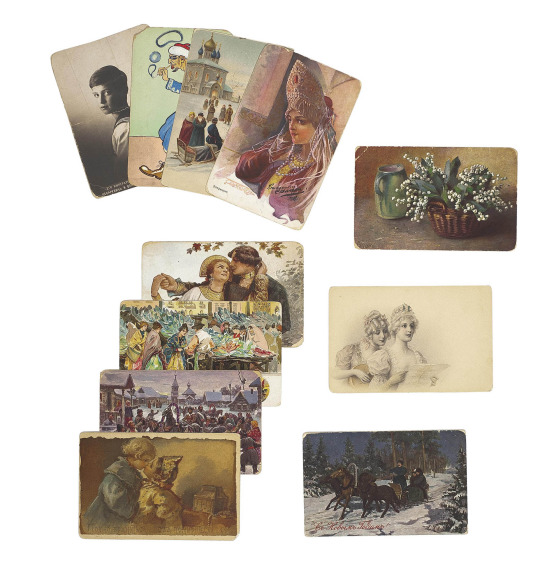
A collection of autograph postcards signed by Grand Duchesses Olga, Tatiana, Maria and Anastasia, addressed to Daria Petrovna Gesse, mostly with greetings on holidays and feast days, in Russian, mostly Tsarskoe selo, 1910-1918, each c. 87 x 140mm, comprising:
Olga (born 1895): 14 postcards signed in Cyrillic ('Ol'ga'), Tsarskoe Selo, Livadia, Tobolsk and n.p., 2 January 1910 - 11/29 March 1918, sending greetings for New Year, Easter, including from Livadia in 1912, thanking for a card in 1913 on a card of the Tsarevich, and the final card from Tobolsk dated in her hand, addressed to the recipient in Kiev, and post-marked 30 March, franked again in Petrograd on 16 August with a stamp 'Returned due to military circumstances', in which she thanks for a letter received earlier, saying all are well, mentioning the weather, that they were working in the garden, ending 'Tseluiu krepko' (I kiss you tenderly).
Tatiana (born 1897): 9 postcards signed in Cyrillic ('Tat'iana'), Tsarskoe Selo, Livadia and n.p., 3 January 1910 - New Year 1916/17 and n.d., thanking for cards and sending greetings at New Year, the recipient's name's day, and Easter, including that from Livadia in 1914, expressed with warmth, including one undated, where the Grand Duchess ends 'Tseluiu krepko' (I kiss you warmly).
Olga and Tatiana: One postcard signed by both in Cyrillic, dated Tsarskoe Selo 19 March 1910.
Maria (born 1899): One postcard signed in Cyrillic ('Mariia'), postmarked Tsarskoe Selo 20 April 1910, sending Easter greetings, and giving the recipient's address as 'Zdes' (Here).
Anastasia (born 1901): One postcard signed in Cyrillic ('Anastasiia'), postmarked Tsarskoe Selo 20 April 1910, sending Easter greetings.
Maria and Anastasia: 3 postcards signed by both, sending greetings for New Year 1913, for Easter undated, and Christmas 1916.
Card sent to Daria Petrovna Gesse (1890-1977), the daughter of General Petr Pavlovich Gesse, chief of security at the palace of Tsarskoe selo from 1890 to 1906, a hero of the Russo-Turkish war of 1877-78, and aide-de-camp to the Emperor. Her mother Maria Nikolaevna was play-mate to the children, companion and later lady-in-waiting to Grand Duchess Olga.
7 notes
·
View notes
Text
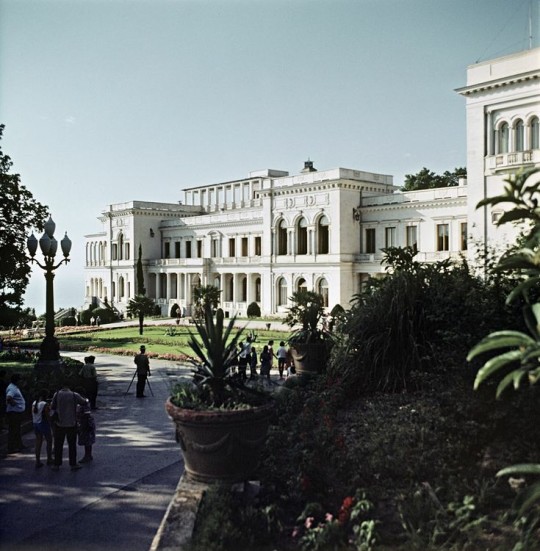
Livadia Palace was the summer retreat of the last Russian Tsar, Nicholas II, and his family in Livadiya, Crimea.Formerly granted to Lambros Katsonis and later a possession of the Potocki family, the Livadia estate became a summer residence of the Russian Imperial family in the 1860s, when architect Ippolito Antonovich
Monighetti built a large palace (the Grand Palace),a small palace (Maliy Palace) and a church there. The residence was frequented by Tsar Alexander II of Russia, while his successor Tsar Alexander III used to live (and died) at the Maliy Palace.His son Tsar Nicholas II decided to have the Grand Palace demolished and replaced with a larger structure. (The smaller palace was preserved, as the place of his father's death, but was later destroyed during World War II.)
Around 1909, Nikolay Petrovich Krasnov, Yalta's most fashionable architect, responsible for the grand ducal residences in Koreiz, was engaged to prepare plans for a new imperial palace. The Tsar's diary indicates that the design was much discussed in the Imperial Family; it was decided that all four façades of the palace should look different. After 17 months of construction, the new palace was inaugurated on 11 September 1911.
Livadia Palace was the place Tsar Nicholas ll chose to retire to after his abdication and the forming of the new government of Russia.
2 notes
·
View notes
Text
Nicholas II and his cars
Nicholas II did not rush into the "motor" craze. For two years, he took rides on the car owned by Lt. General A.A. Mossolov until Nicholas' Minister, Count Fredericks, asked the Tsar if he wanted to acquire a motorcar. The Tsar responded quickly: "Yes, of course!
The Tsar fell in love with the automobile. The first car he purchased was a French Delaunay-Belleville which was the Tsar's choice for short trips and in-town use. He liked the German-built Mercedes for long trips…and speed.
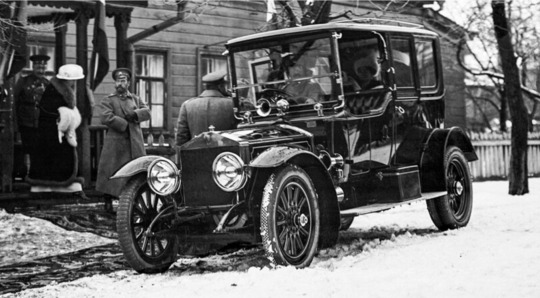
Nicholas II getting into his Rolls Royce
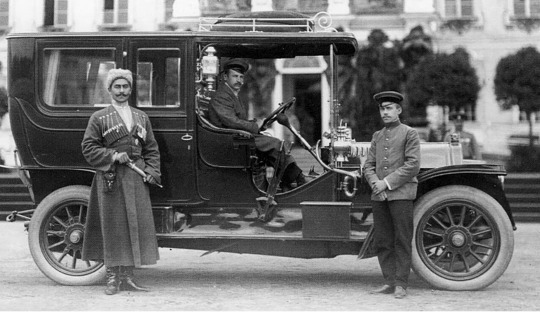
Nicholas II's Mercedes Benz
The Imperial Garages were established in 1905 in Tsarskoe Selo and Peterhof. Later, garages were added in the Winter Palace in St. Petersburg and Livadia Palace in Crimea. There was a budget to maintain the Imperial Garages, which included money to purchase vehicles, training of the drivers (who were responsible for driving and fixing, and maintaining the cars), washers, uniforms for the staff and the brick-and-mortar buildings where the cars were housed. The vehicles served the Tzar, the Empress, the Imperial children, and their suite.
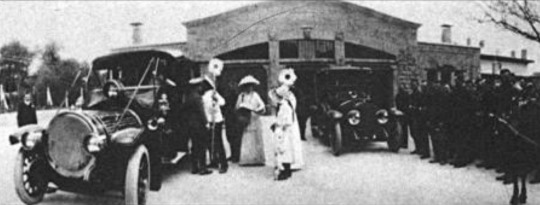
The Imperial family standing by their garages in Livadia
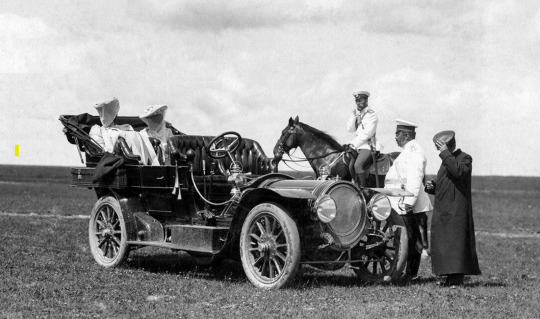
Nicholas is on a horse next to one of his Delaunay Bellevilles
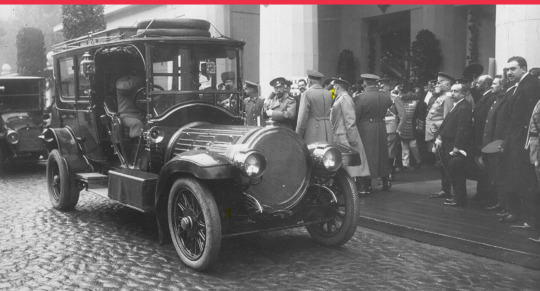
This was Nicholas II's "baby," a Delaunay-Belleville '70 S.M.T
Whenever the Tzar went out in one of his cars (for business or personal matters), another car had to follow him. Security always annoyed Nicholas, more so when driving his cars (a chauffeur did that most of the time.) When Nicholas drove, he loved to speed, of course.
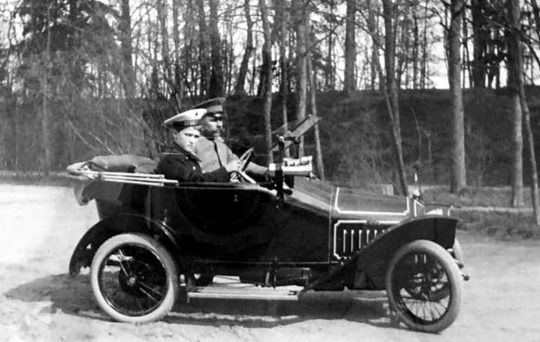
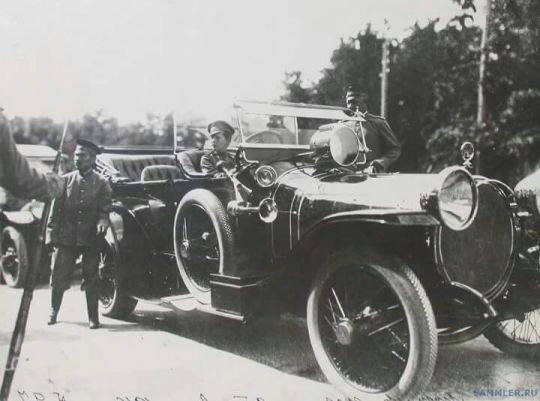

Like any boy, his age, Alexei got into the "motor" craze! (On the left he seems to be trying to learn how to change a tire). In the photo on top, he is driving a small car, his Peaugot "Bebe"
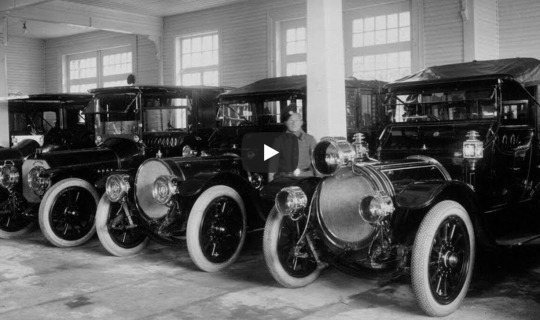
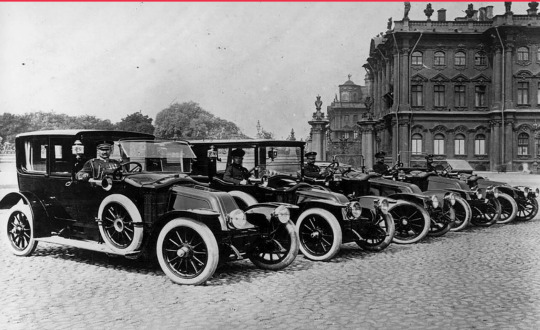
Some of Nicholas II's cars
Cars gave Count Fredericks, Nicholas' court minister, many headaches. He had a difficult time getting Nicholas to buy his first car, but then he could not make him stop getting new ones. Nicholas bought his first car in 1905. By 1917, he had 56 cars in his garages…more than any other European Court.
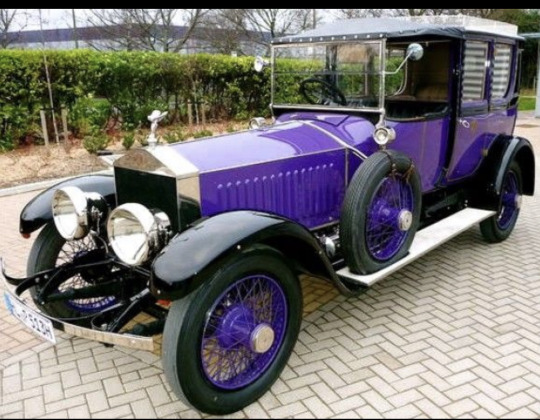
Nicholas II ordered this car, a classic 1914-built Rolls Royce Ghost, the year before he was murdered; it is not known if or how long he used the car. It was bought by a collector at auction for an extraordinary amount.
References:
Alexander Palace Time Machine. (retrieved 2024, April 24). The Imperial Garage: The Tzar and his cars. Blog: https://www.alexanderpalace.org/palace/impgarage.php
Manaev, Georgy. (2022, May 11). Nicholas II Awesome Car Collection. Blog: https://www.rbth.com/history/335016-nicholas II-garage-car-collection
118 notes
·
View notes
Text
Why is Ukraine’s Kerch Crisis Any of Our Business?
By Patrick J. Buchanan, The American Conservative, November 30, 2018
Upon his departure for the G-20 gathering in Buenos Aires, President Donald Trump canceled his planned weekend meeting with Vladimir Putin, citing as his reason the Russian military’s seizure and holding of three Ukrainian ships and 24 sailors.
But was Putin really the provocateur in Sunday’s naval clash outside Kerch Strait, the Black Sea gateway to the Sea of Azov?
Or was the provocateur Ukrainian President Petro Poroshenko?
First, a bit of history. In 2014, after the pro-Russian regime in Kiev was ousted in a coup, and a pro-NATO regime installed with U.S. backing, Putin detached and annexed Crimea, for centuries the homeport of Russia’s Black Sea fleet.
With the return of Crimea, Russia now occupied both sides of Kerch Strait. And this year, Russia completed a 12-mile bridge over the strait and Putin drove the first truck across.
The Sea of Azov became a virtual Russian lake, access to which was controlled by Russia, just as access to the Black Sea is controlled by Turkey.
While the world refused to recognize the new reality, Russia began to impose rules for ships transiting the strait, including 48 hours notice to get permission.
Ukrainian vessels, including warships, would have to notify Russian authorities before passing beneath the Kerch Strait Bridge into the Sea of Azov to reach their major port of Mariupol.
Sunday, two Ukrainian artillery ships and a tug, which had sailed out of Odessa in western Ukraine, passed through what Russia now regards as its territorial waters off Crimea and the Kerch Peninsula. Destination: Mariupol.
The Ukrainian vessels refused to obey Russian directives to halt.
Russian warships fired at the Ukrainian vessels and rammed the tug. Three Ukrainian sailors were wounded, and 24 crew taken into custody.
Russia’s refusal to release the sailors was given by President Trump as the reason for canceling his Putin meeting.
Moscow contends that Ukraine deliberately violated the new rules of transit that Kiev had previously observed, to create an incident.
For his part, Putin has sought to play the matter down, calling it a “border incident, nothing more.”
“The incident in the Black Sea was a provocation organized by the authorities and maybe the president himself. …(Poroshenko’s) rating is falling…so he needed to do something.”
Maxim Eristavi, a fellow at the Atlantic Council, seems to concur: “Poroshenko wants to get a head start in his election campaign. He is playing the card of commander in chief, flying around in military uniform, trying to project that he is in control.”
Our U.N. Ambassador Nikki Haley, however, accused Russia of “outlaw actions” against the Ukrainian vessels and “an arrogant act the international community will never accept.”
Predictably, our interventionists decried Russian “aggression” and demanded we back up our Ukrainian “ally” and send military aid.
Why was Poroshenko’s ordering of gunboats into the Sea of Azov, while ignoring rules Russia set down for passage, provocative?
Because Poroshenko, whose warships had previously transited the strait, had to know the risk that he was taking and that Russia might resist.
Why would he provoke the Russians?
Because, with his poll numbers sinking badly, Poroshenko realizes that unless he does something dramatic, his party stands little chance in next March’s elections.
Immediately after the clash, Poroshenko imposed martial law in all provinces bordering Russia and the Black Sea, declared an invasion might be imminent, demanded new Western sanctions on Moscow, called on the U.S. to stand with him, and began visiting army units in battle fatigues.
Some Westerners want even more in the way of confronting Putin.
Adrian Karatnycky of the Atlantic Council urges us to build up U.S. naval forces in the Black Sea, send anti-aircraft and anti-ship missiles to Ukraine, ratchet up sanctions on Russia, threaten to expel her from the SWIFT system of international bank transactions, and pressure Europe to cancel the Russians’ Nord Stream 2 and South Stream oil pipelines into Europe.
But there is a larger issue here.
Why is control of the Kerch Strait any of our business?
Why is this our quarrel, to the point that U.S. strategists want us to confront Russia over a Crimean Peninsula that houses the Livadia Palace that was the last summer residence of Czar Nicholas II?
If Ukraine had a right to break free of Russia in 1991, why do not Crimea, Donetsk and Luhansk have the right to break free of Kiev?
Why are we letting ourselves be dragged into everyone’s quarrels--from who owns the islets in the South China Sea, to who owns the Senkaku and Southern Kurils; and from whether Transnistria had a right to secede from Moldova, to whether South Ossetia and Abkhazia had the right to break free of Georgia, when Georgia broke free of Russia?
Do the American people care a fig for these places? Are we really willing to risk war with Russia or China over who holds title to them?
2 notes
·
View notes
Text
Events 2.4
211 – Following the death of Rome's Emperor Septimius Severus at Eboracum (modern York, England) while preparing to lead a campaign against the Caledonians, the empire is left in the control of his two quarrelling sons, Caracalla and Geta, whom he had instructed to make peace.
960 – The coronation of Zhao Kuangyin as Emperor Taizu of Song, initiating the Song dynasty period of China that would last more than three centuries.
1169 – A strong earthquake strikes the Ionian coast of Sicily, causing tens of thousands of injuries and deaths, especially in Catania.
1454 – In the Thirteen Years' War, the Secret Council of the Prussian Confederation sends a formal act of disobedience to the Grand Master.
1555 – John Rogers is burned at the stake, becoming the first English Protestant martyr under Mary I of England.
1703 – In Edo (now Tokyo), all but one of the Forty-seven Ronin commit seppuku (ritual suicide) as recompense for avenging their master's death.
1758 – The city of Macapá in Brazil is founded by Sebastião Veiga Cabral.
1789 – George Washington is unanimously elected as the first President of the United States by the U.S. Electoral College.
1794 – The French legislature abolishes slavery throughout all territories of the French First Republic. It would be reestablished in the French West Indies in 1802.
1797 – The Riobamba earthquake strikes Ecuador, causing up to 40,000 casualties.
1801 – John Marshall is sworn in as Chief Justice of the United States.
1810 – Napoleonic Wars: Britain seizes Guadeloupe.
1820 – The Chilean Navy under the command of Lord Cochrane completes the two-day long Capture of Valdivia with just 300 men and two ships.
1825 – The Ohio Legislature authorizes the construction of the Ohio and Erie Canal and the Miami and Erie Canal.
1846 – The first Mormon pioneers make their exodus from Nauvoo, Illinois, westward towards Salt Lake Valley.
1859 – The Codex Sinaiticus is discovered in Egypt.
1861 – American Civil War: In Montgomery, Alabama, delegates from six breakaway U.S. states meet and form the Confederate States of America.
1899 – The Philippine–American War begins with the Battle of Manila.
1932 – Second Sino-Japanese War: Harbin, Manchuria, falls to Japan.
1938 – Adolf Hitler appoints himself as head of the Armed Forces High Command.
1941 – The United Service Organization (USO) is created to entertain American troops.
1945 – World War II: Santo Tomas Internment Camp is liberated from Japanese authority.
1945 – World War II: The Yalta Conference between the "Big Three" (Churchill, Roosevelt, and Stalin) opens at the Livadia Palace in the Crimea.
1945 – World War II: The British Indian Army and Imperial Japanese Army begin a series of battles known as the Battle of Pokoku and Irrawaddy River operations.
1948 – Ceylon (later renamed Sri Lanka) becomes independent within the British Commonwealth.
1961 – The Angolan War of Independence and the greater Portuguese Colonial War begin.
1966 – All Nippon Airways Flight 60 plunges into Tokyo Bay, killing 133.
1967 – Lunar Orbiter program: Lunar Orbiter 3 lifts off from Cape Canaveral's Launch Complex 13 on its mission to identify possible landing sites for the Surveyor and Apollo spacecraft.
1969 – Yasser Arafat takes over as chairman of the Palestine Liberation Organization.
1974 – The Symbionese Liberation Army kidnaps Patty Hearst in Berkeley, California.
1974 – M62 coach bombing: The Provisional Irish Republican Army (IRA) explodes a bomb on a bus carrying off-duty British Armed Forces personnel in Yorkshire, England. Nine soldiers and three civilians are killed.
1975 – Haicheng earthquake (magnitude 7.3 on the Richter scale) occurs in Haicheng, Liaoning, China.
1976 – In Guatemala and Honduras an earthquake kills more than 22,000.
1977 – A Chicago Transit Authority elevated train rear-ends another and derails, killing 11 and injuring 180, the worst accident in the agency's history.
1992 – A coup d'état is led by Hugo Chávez against Venezuelan President Carlos Andrés Pérez.
1997 – En route to Lebanon, two Israeli Sikorsky CH-53 troop-transport helicopters collide in mid-air over northern Galilee, Israel, killing 73.
1998 – The 5.9 Mw Afghanistan earthquake shakes the Takhar Province with a maximum Mercalli intensity of VII (Very strong). With 2,323 killed, and 818 injured, damage is considered extreme.
1999 – Unarmed West African immigrant Amadou Diallo is shot 41 times by four plainclothes New York City police officers on an unrelated stake-out, inflaming race relations in the city.
2000 – The World Summit Against Cancer for the New Millennium, Charter of Paris is signed by the President of France, Jacques Chirac and the Director General of UNESCO, Koichiro Matsuura, initiating World Cancer Day which is held on February 4 every year.
2003 – The Federal Republic of Yugoslavia adopts a new constitution, becoming a loose confederacy between Montenegro and Serbia.
2004 – Facebook, a mainstream online social networking site, is founded by Mark Zuckerberg and Eduardo Saverin.
2015 – TransAsia Airways Flight 235, with 58 people on board, en route from the Taiwanese capital Taipei to Kinmen, crashes into the Keelung River just after takeoff, killing 43 people.
2020 – The COVID-19 pandemic causes all casinos in Macau to be closed down for 15 days.
0 notes
Text
Welcome! Dobro Paw-shallow-its!
За Дружбу Между Народам
To Friendship Between Nations - traditional Russian toast.
“ Russia has always been a curiously unpleasant country despite her great literature. Unfortunately, Russians today have completely lost their ability to kill tyrants. ” —
Vladimir Nabokov
Russia, it seems to me, is a country which, at the current time, operates a totalitarian government “under diplomatic cover”.
Greetings! Welcome to Skydogblog – Beyond the Pale
We will be talking about Russia – its culture, history, language, and literature – especially its authors and especially Vladimir Nabokov. Discussion will also be about current events and especially its politics, current and past.
Current events sometimes overtake us. So I’m going to post my take on the recent fire in a Siberian shopping mall which took the lives of 64 people, 41 one of them children.
After that will be a little explanation about the blog itself.
It is perhaps indicative of the Russian milieu – a catastrophe born of some significant degree of stupor combined with negligence and shocking lack of ready equipage to deal failed safety mechanisms.
This will be put at the feet of Putin; at the feet of the ultra-conservatives who worship at the feet tradition. Because tradition dictates in Russia, a certainly chauvinistic society, that men drink vodka for every celebration, deal, or just because.
A society of alcoholics; where life is a joke until it’s not.
Early on in the 90s Putin went after independent tv stations, newspapers, whatever because he was incensed that they would investigate him for corruption. Even though he was and is involved up to his neck - Putin himself does not consider it corruption. He considers himself the ruler, backed by a “mandate” of nearly incredible voter turnout for him. He is, by all accounts, the new “Tsar”, the new “Stalin” the new “Lenin”, if you will.
However, having failed to extradite the “guilty” parties and, in one instance at least, managed to kill one of them in Britain.
After a number of years though he only goes after dangerous people, people with credibility who can provide details clearly which would portray Putin as indeed, another Stalin, writ large.
He did not back off out of compassion, he ignores the Russian independent media now. They can say whatever they like. They can call him names, make snarky remarks their headlines and even publish hard-hitting investigative journalistic books, which I will list here as good reads.
All of these media outlets can say and do pretty much as they please because IT DOESN’T MATTER ANYMORE.
Putin has succeeded in making Russia a modern day totalitarian state with all the amenities of a modern civilization.
Diplomatic cover means what it sounds like. In Russian embassies around the world, esp. here in the US, post FSB (KGB) agents to their embassies who operate under diplomatic cover, in other words, unless we catch them “spying” there is little we can do other than expel the suspected individual.
“A legal resident spy operates in a foreign country under official cover (such as from his country's embassy). He is an official member of the consular staff, such as a commercial, cultural, or military attaché. Thus, he has diplomatic immunity from prosecution and cannot be arrested by the host country if suspected of espionage. The most the host country can do is send him back to his home country as persona non grata.[3] “
p. 12, Shulsky, Abram N.; Schmitt, Gary James (2002). Silent Warfare: Understanding the World of Intelligence (3rd ed.). Potomac Books, Inc. ISBN 9781574883459.
I find Nabokov is especially relevant because he was deeply rooted in Russian culture; Tsarist Russia and the Revolution.
Nabokov is considered by many to be one of the greatest American authors. No less a personage than John Updike called him the best modern author writing in English.
His father – also named Vladimir – was instrumental in facilitating a peaceful revolution in 1917 and was the leading framer of the liberal constitution embraced by the short lived provisional government.
His father was an attorney and volunteered a great deal of time to frame a constitution which included universal suffrage, universal healthcare and free education. He rallied the troops when the occasion called for it. The constitution he wrote was used by the Provisional Government in the days following the Revolution of 1917.
Eventually pushed out by Lenin and his gangs, Russia was, for a brief shining moment, the most progressive nation of the face of the earth.
His father died shielding a fellow party from a right wing assassin.*
Pretty much all of Nabokov’s best works have characters that suddenly die or disappear. Lolita deserts him exactly half way through the book.
A word about the name of the blog – Beyond the Pale.
From pale (“jurisdiction of an authority, territory under an authority's jurisdiction”), suggesting that anything outside the authority's jurisdiction was uncivilized.
I found this phrase to be especially meaningful as many in the West would consider Russia to be “beyond the pale” – a political and cultural wilderness.
Nabokov wrote Pale Fire after Lolita was published. I have always contended that Nabokov did not write Lolita, Humbert Humbert did. The title itself is a somewhat humorous aside and a tribute to her as well by Humbert – the book itself is really about Humbert.
Pale Fire – the title by itself could also indicate wild fire – a fire beyond the pale, the flames of reality (See Zelazny’s Lord of Light – the sermon of the Budda), “time is the fire in which we burn” – Star Trek.**
This blog will be about Russia, it’s history, culture and it’s current “foreign policy” - I use the quotes because currently the only policy Russia has is whatever passes through totalitarian mindset of Putin. I don’t believe it’s a coincidence there is such a conjunction of names - Putin or Ras-putin?
I write about this because I am concerned that many remember only the halcyon days of the 90s when Putin was supposedly going to institute democratic reforms. He later back tracks and decides against being politically aligned with “liberals” (read: the West), turns against them and turns Russia back to the “bad old days” of conservatism.
*In March 1922, Nabokov's father was fatally shot in Berlin by the Russian monarchist Piotr Shabelsky-Bork as he was trying to shield the real target, Pavel Milyukov, a leader of the Constitutional Democratic Party-in-exile. This mistaken, violent death would echo again and again in Nabokov's fiction, where characters would meet their deaths under accidental terms. (In Pale Fire, for example, one interpretation of the novel has an assassin mistakenly kill the poet John Shade, when his actual target is a fugitive European monarch.) Shortly after his father's death, Nabokov's mother and sister moved to Prague.
**Names are not important... To speak is to name names, but to speak is not important. A thing happens once that has never happened before. Seeing it, a man looks upon reality. He cannot tell others what he has seen. Others wish to know, however, so they question him saying, 'What is it like, this thing you have seen?' So he tries to tell them. Perhaps he has seen the very first fire in the world. He tells them, 'It is red, like a poppy, but through it dance other colors. It has no form, like water, flowing everywhere. It is warm, like the sun of summer, only warmer. It exists for a time upon a piece of wood, and then the wood is gone, as though it were eaten, leaving behind that which is black and can be sifted like sand. When the wood is gone, it too is gone.' Therefore, the hearers must think reality is like a poppy, like water, like the sun, like that which eats and excretes. They think it is like to anything that they are told it is like by the man who has known it. But they have not looked upon fire. They cannot really know it. They can only know of it. But fire comes again into the world, many times. More men look upon fire. After a time, fire is as common as grass and clouds and the air they breathe. They see that, while it is like a poppy, it is not a poppy, while it is like water, it is not water, while it is like the sun, it is not the sun, and while it is like that which eats and passes wastes, it is not that which eats and passes wastes, but something different from each of these apart or all of these together. So they look upon this new thing and they make a new word to call it. They call it 'fire.'
"If they come upon one who still has not seen it and they speak to him of fire, he does not know what they mean. So they, in turn, fall back upon telling him what fire is like. 'As they do so, they know from their own experience that what they are telling him is not the truth, but only a part of it. They know that this man will never know reality from their words, though all the words in the world are theirs to use. He must look upon the fire, smell of it, warm his hands by it, stare into its heart, or remain forever ignorant. Therefore, 'fire' does not matter, 'earth' and 'air' and 'water' do not matter. 'I' do not matter. No word matters. But man forgets reality and remembers words. The more words he remembers, the cleverer do his fellows esteem him. He looks upon the great transformations of the world, but he does not see them as they were seen when man looked upon reality for the first time. Their names come to his lips and he smiles as he tastes them, thinking he knows them in the naming. The thing that has never happened before is still happening. It is still a miracle. The great burning blossom squats, flowing, upon the limb of the world, excreting the ash of the world, and being none of these things I have named and at the same time all of them, and this is reality — the Nameless.

The Tsar’s Winter Palace Livadia - in the Crimea - where Putin vacations and has a Dacha
0 notes
Photo
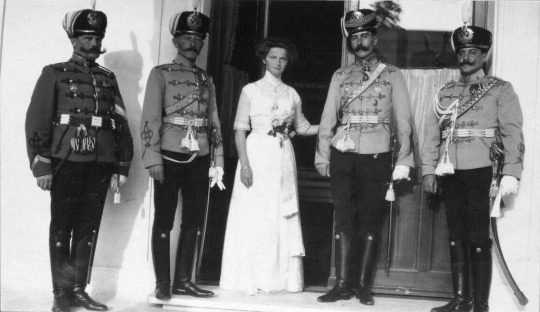
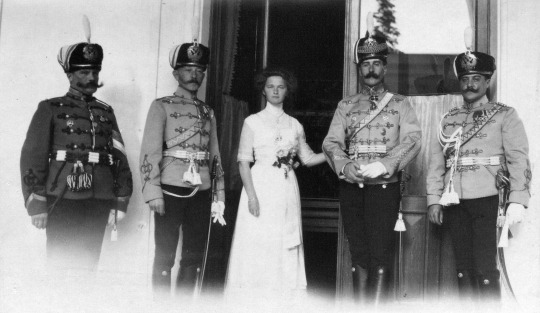
Sergeant-major Ivan Lefler, captain Alexander Bentsselevich, Grand Duchess Olga Nikolaevna, commander Anatoly Martynov and staff-captain Nikolai Ponomarev at the Livadia Palace, 3rd November 1911.
"3rd November. Thursday.
Today, for the first time I put my hair up and a new, long, white dress. All morning I received bouquets and many telegrams from all kinds of people.
Before the prayer service there was a deputation from my regiment. Regiment : Martynov, Lindestrem, Ponomarev and Bentsselevich. In the afternoon, played tennis with Papa, C[ount] Nirod, N[ikolai]P[avlovich Sablin], T[atiana], Anya, Babitsyn and Butakov and Voronov. It was a lot of fun. Mama was lying down nearby. Drank tea in the tennis house with everyone.
There was a big dinner at seven o'clock. There were 10 of us at my table. NP, C[ount] Nirod and Martynov. It was so good to have them.
My regiment got the white pelisse.
At 9 o'clock there was my 1st ball. Knyazhevich and I opened it. Danced all the time until one in the morning. It was a lot of fun. There were many officers and ladies. Everyone had a lot of fun.
I am 16 years old. "
(1911 Diary of Grand Duchess Olga Nikolaevna)
Photos from:
Grand Duchess Olga Nikolaevna's 1910-1912 Album
57 notes
·
View notes